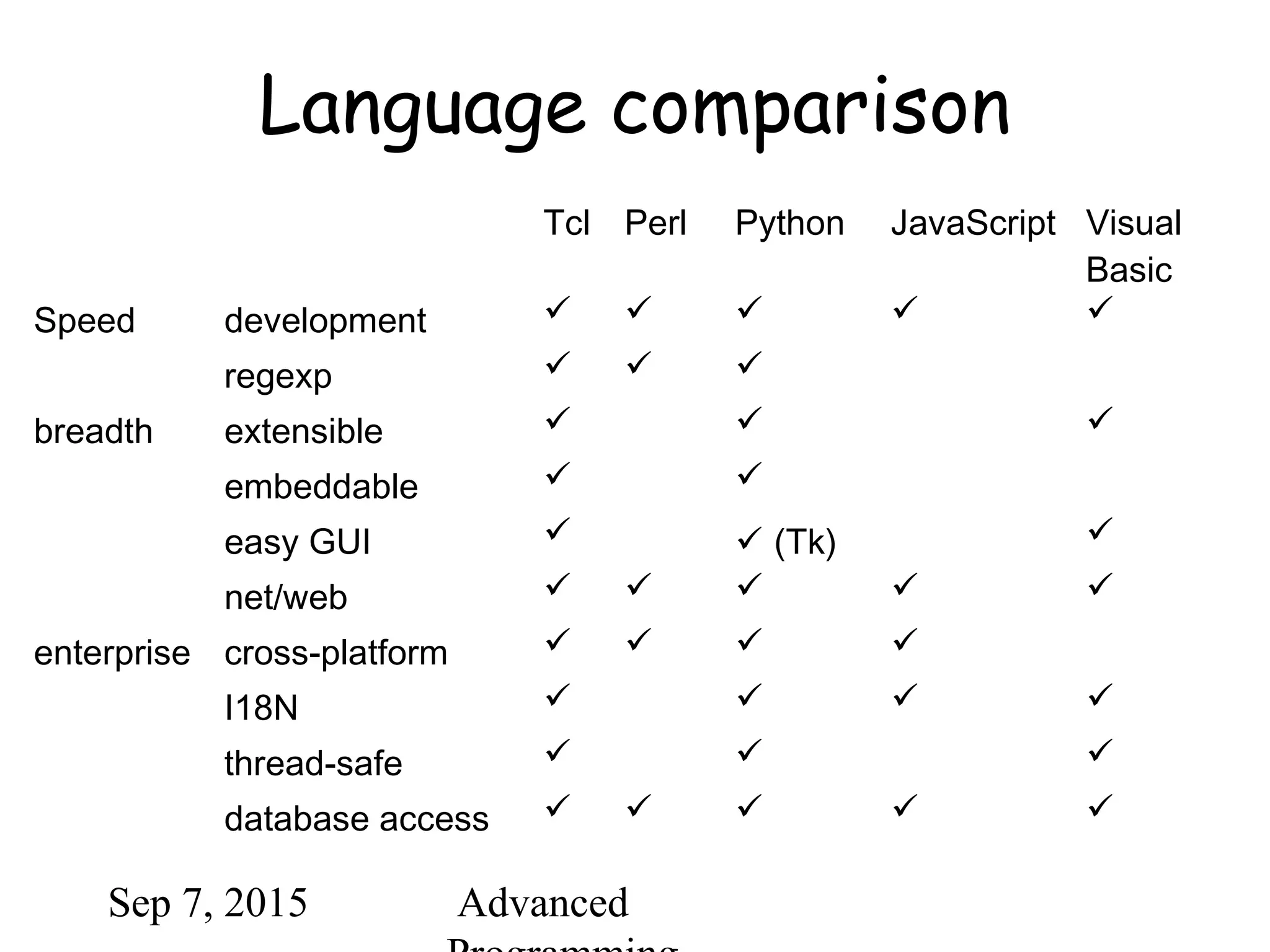This document provides an introduction and overview of the Python programming language. It discusses Python's origins, philosophy, features, and uses. Key points covered include Python's simplicity, power, object-oriented approach, and wide portability. Examples are provided of basic Python syntax and constructs like strings, lists, functions, modules, and dictionaries.
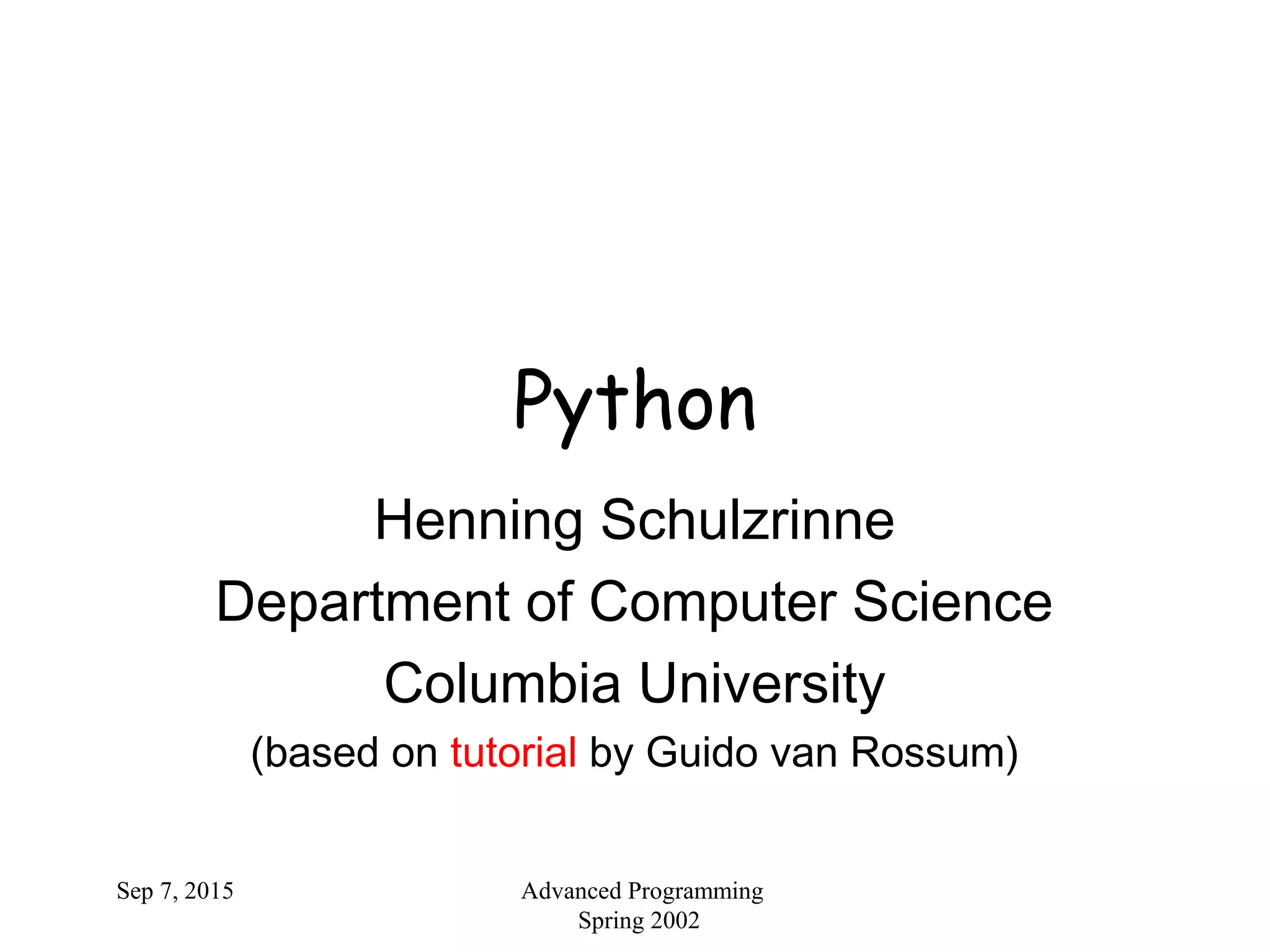
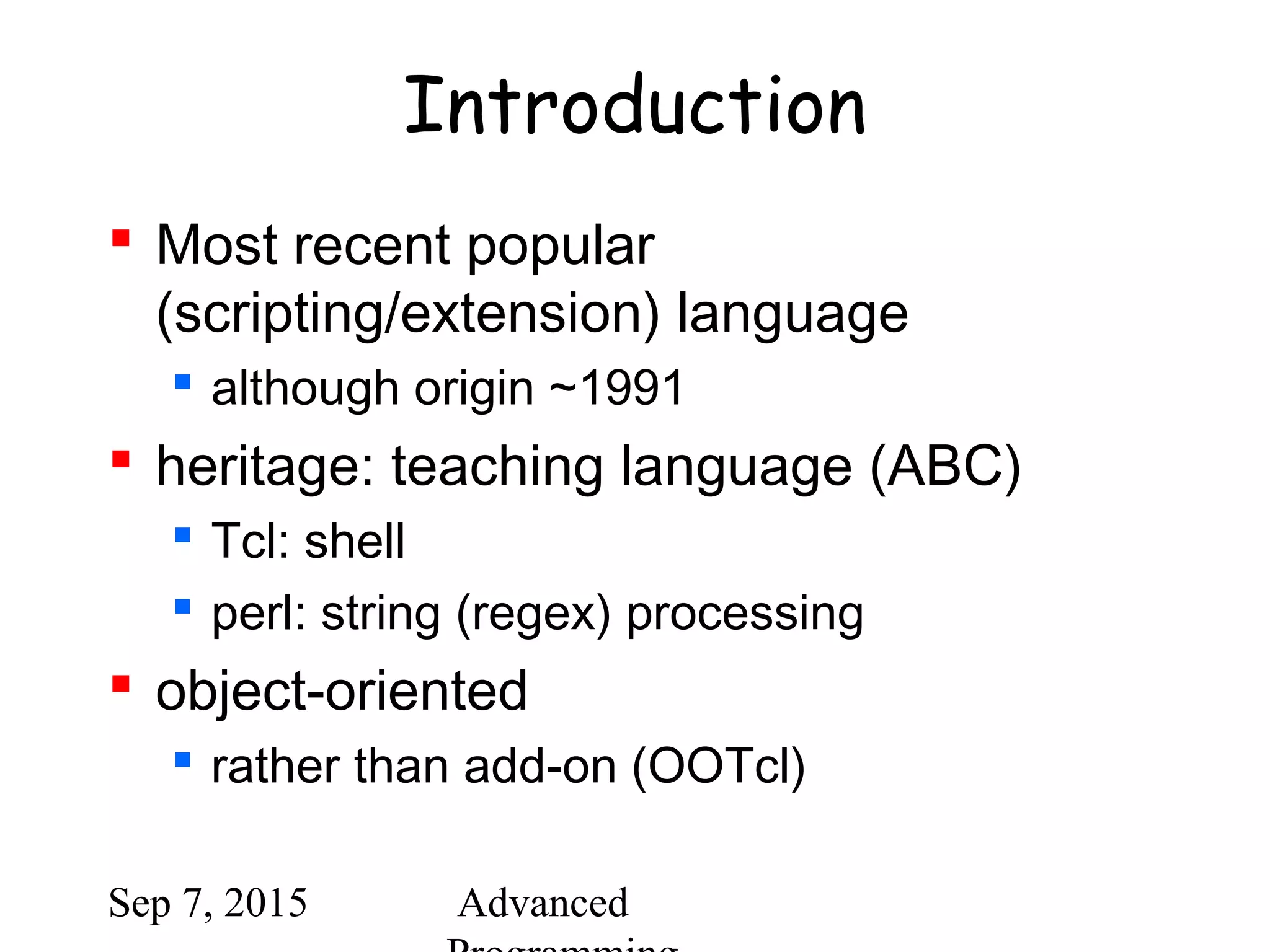
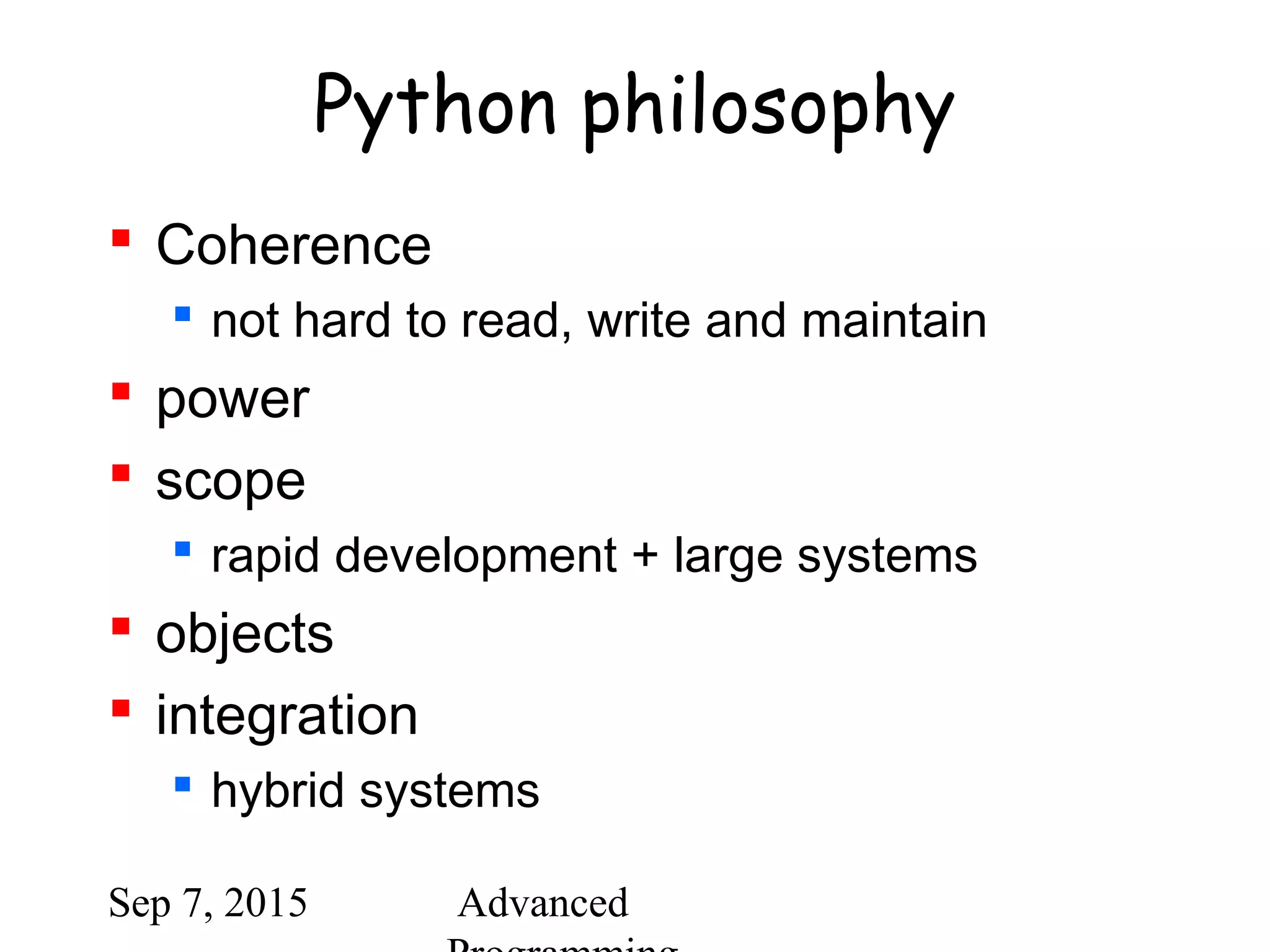
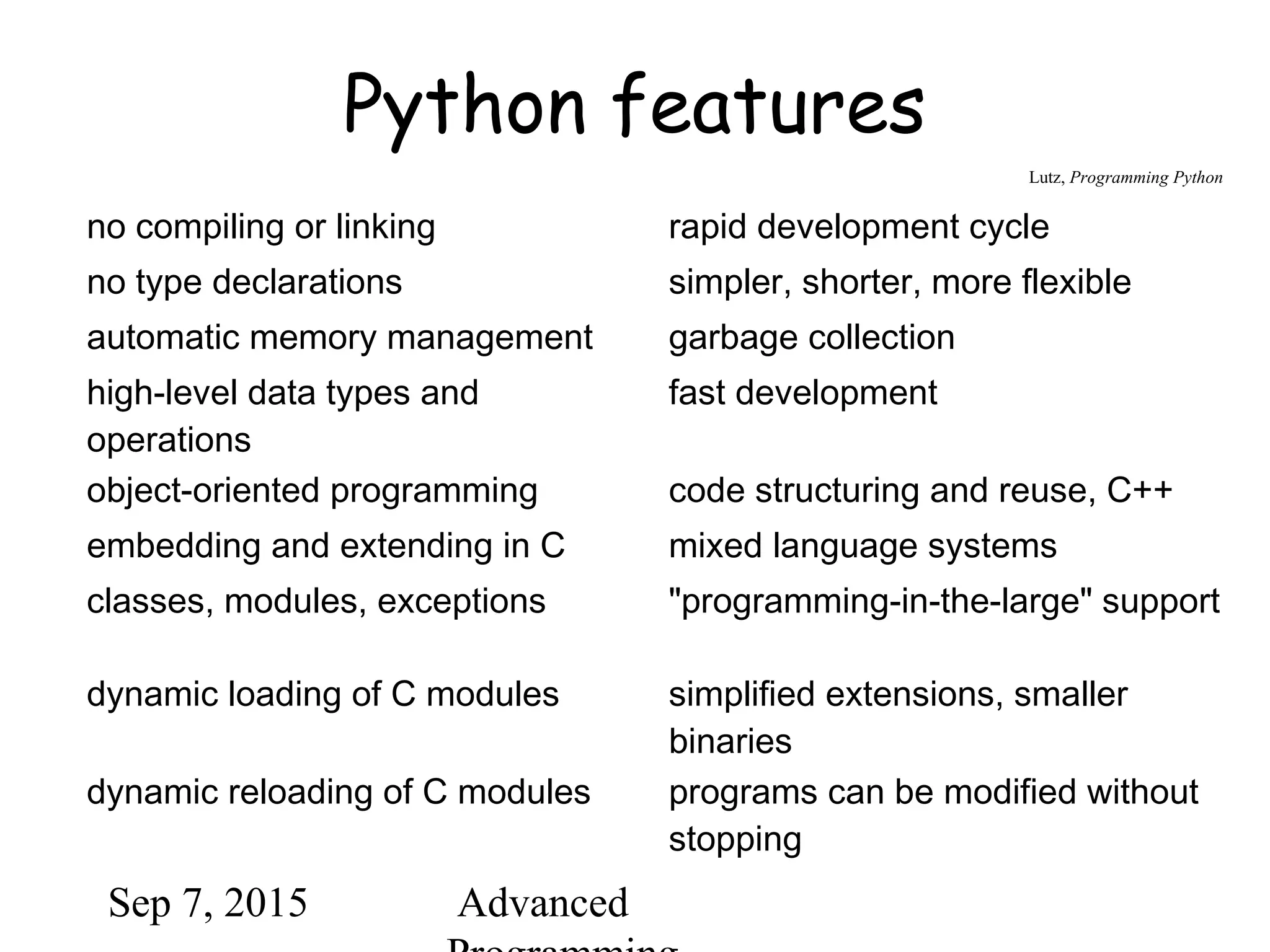
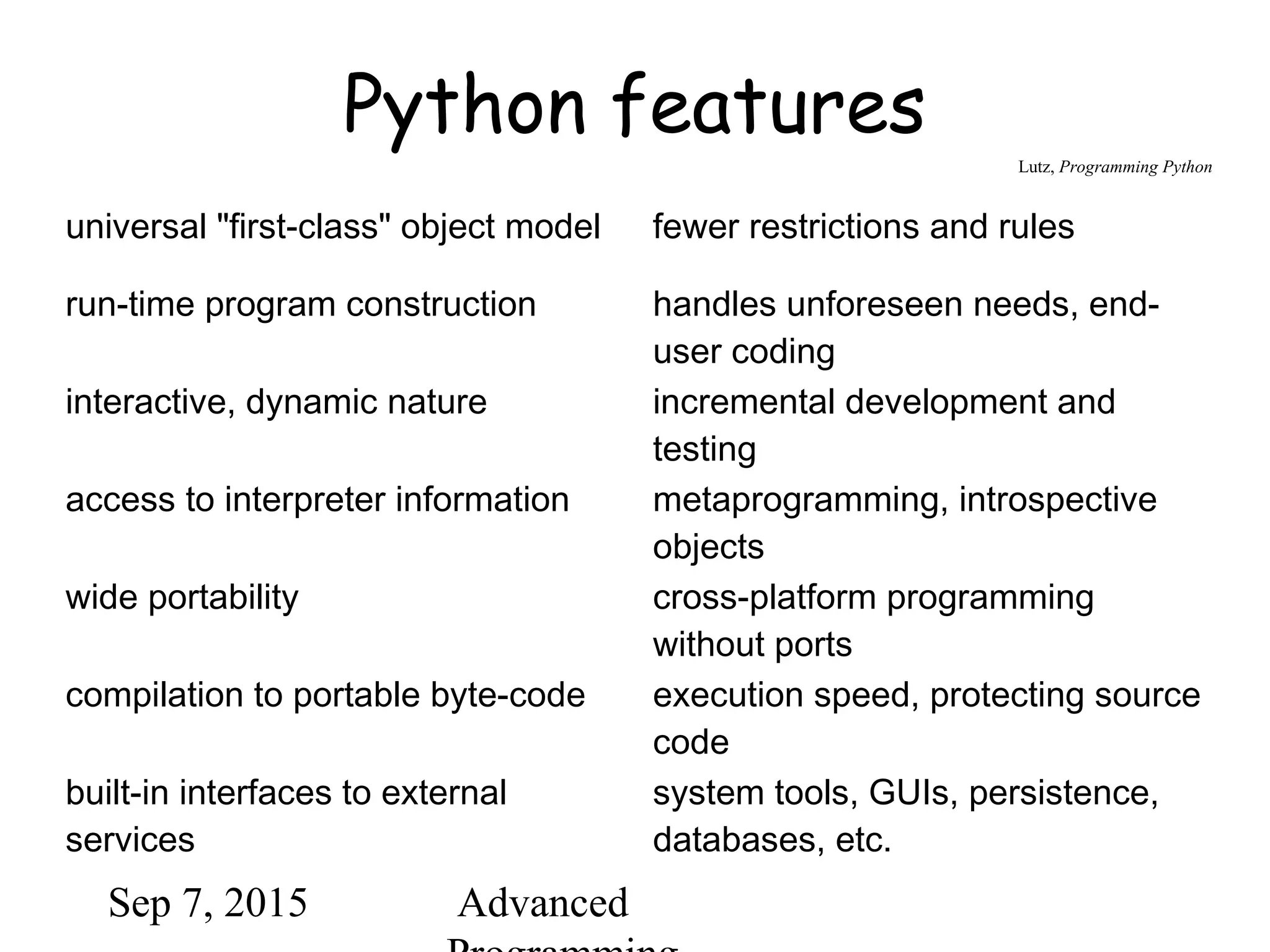
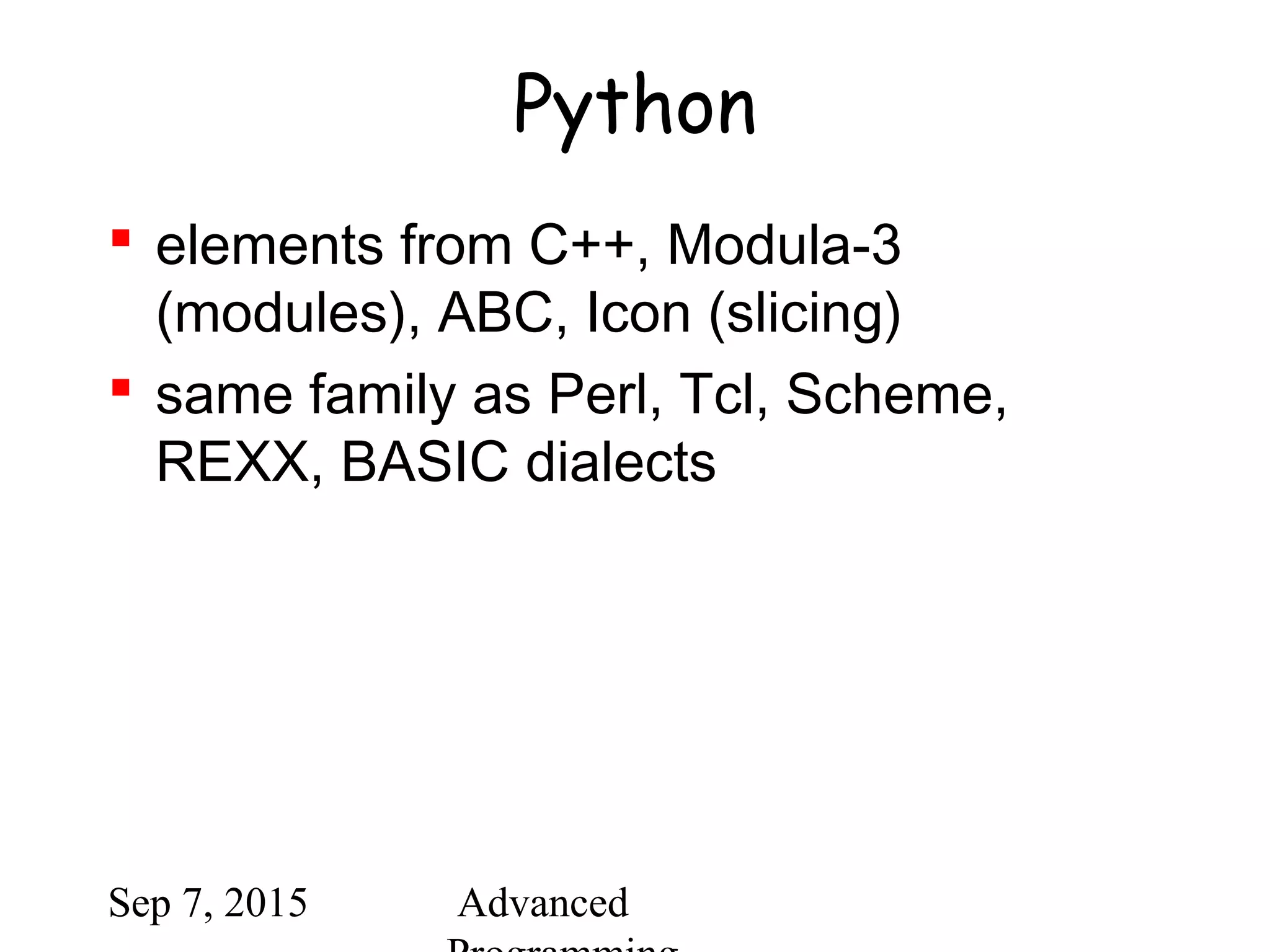
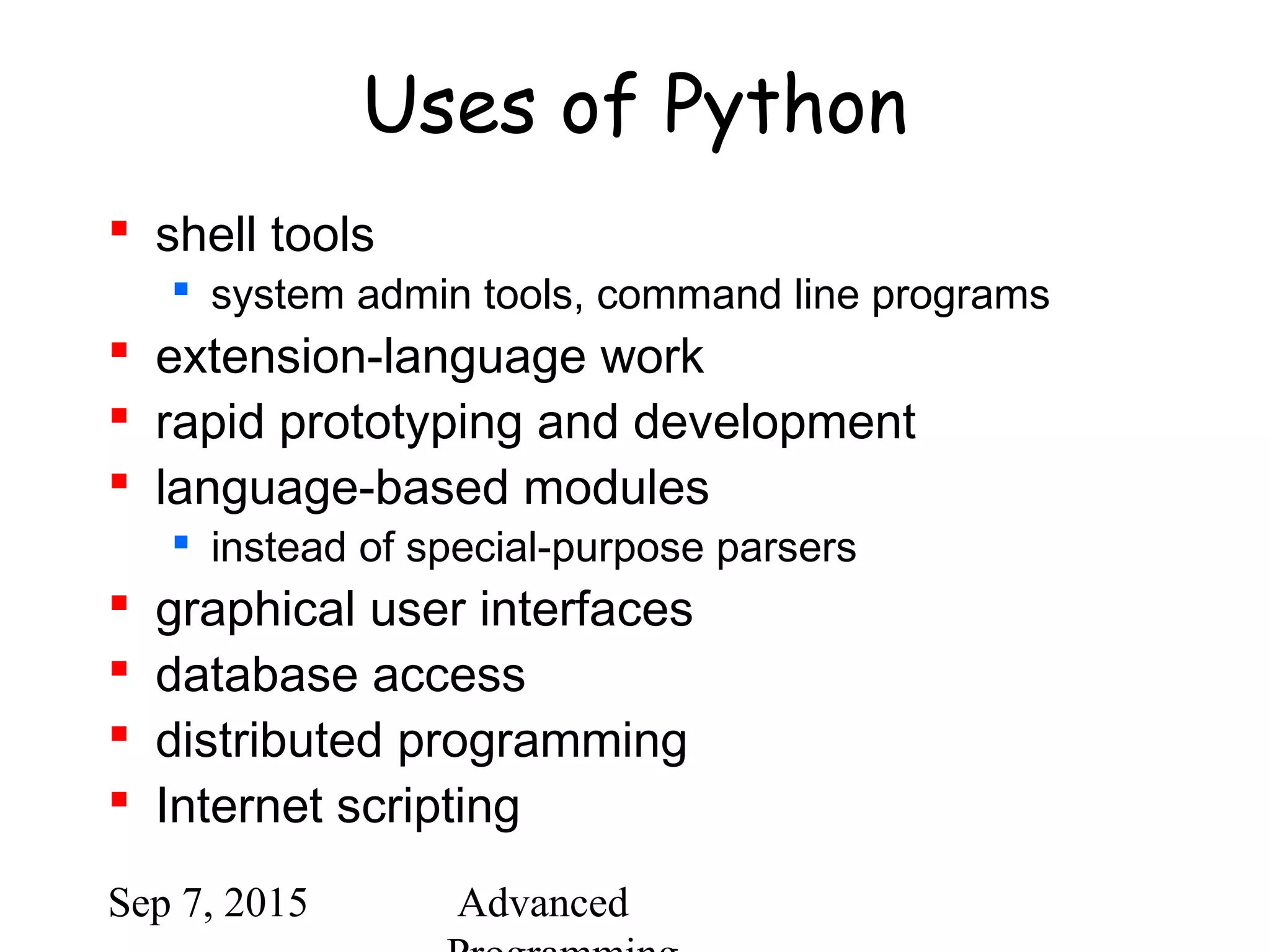
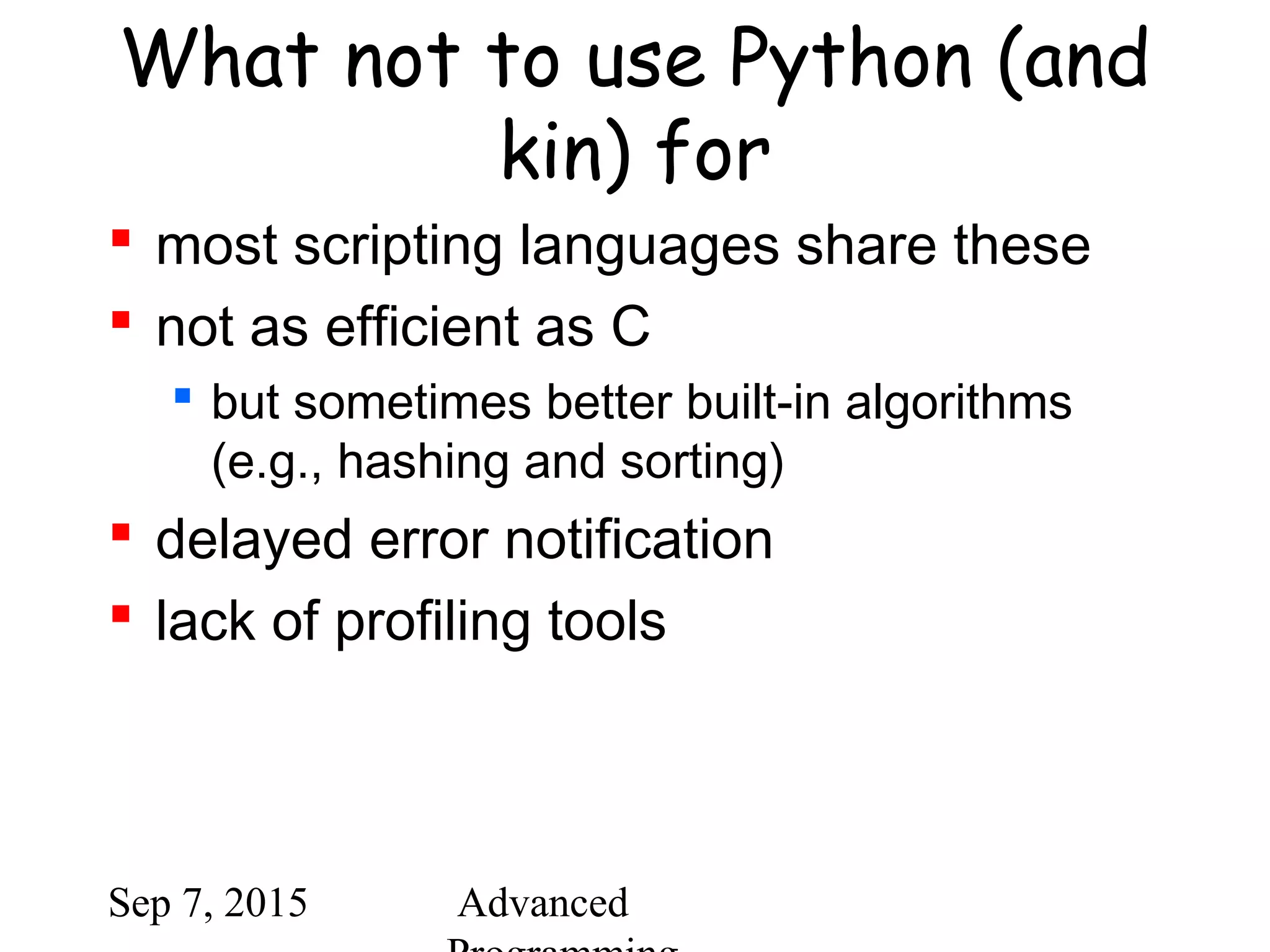
![Sep 7, 2015 Advanced
Using python
/usr/local/bin/python
#! /usr/bin/env python
interactive use
Python 1.6 (#1, Sep 24 2000, 20:40:45) [GCC 2.95.1 19990816 (release)] on sunos5
Copyright (c) 1995-2000 Corporation for National Research Initiatives.
All Rights Reserved.
Copyright (c) 1991-1995 Stichting Mathematisch Centrum, Amsterdam.
All Rights Reserved.
>>>
python –c command [arg] ...
python –i script
read script first, then interactive](https://image.slidesharecdn.com/python-bb10da9e-c171-47c6-9bfc-577b4e9d0dd4-1201208930-150907064501-lva1-app6891/75/python-ppt-9-2048.jpg)
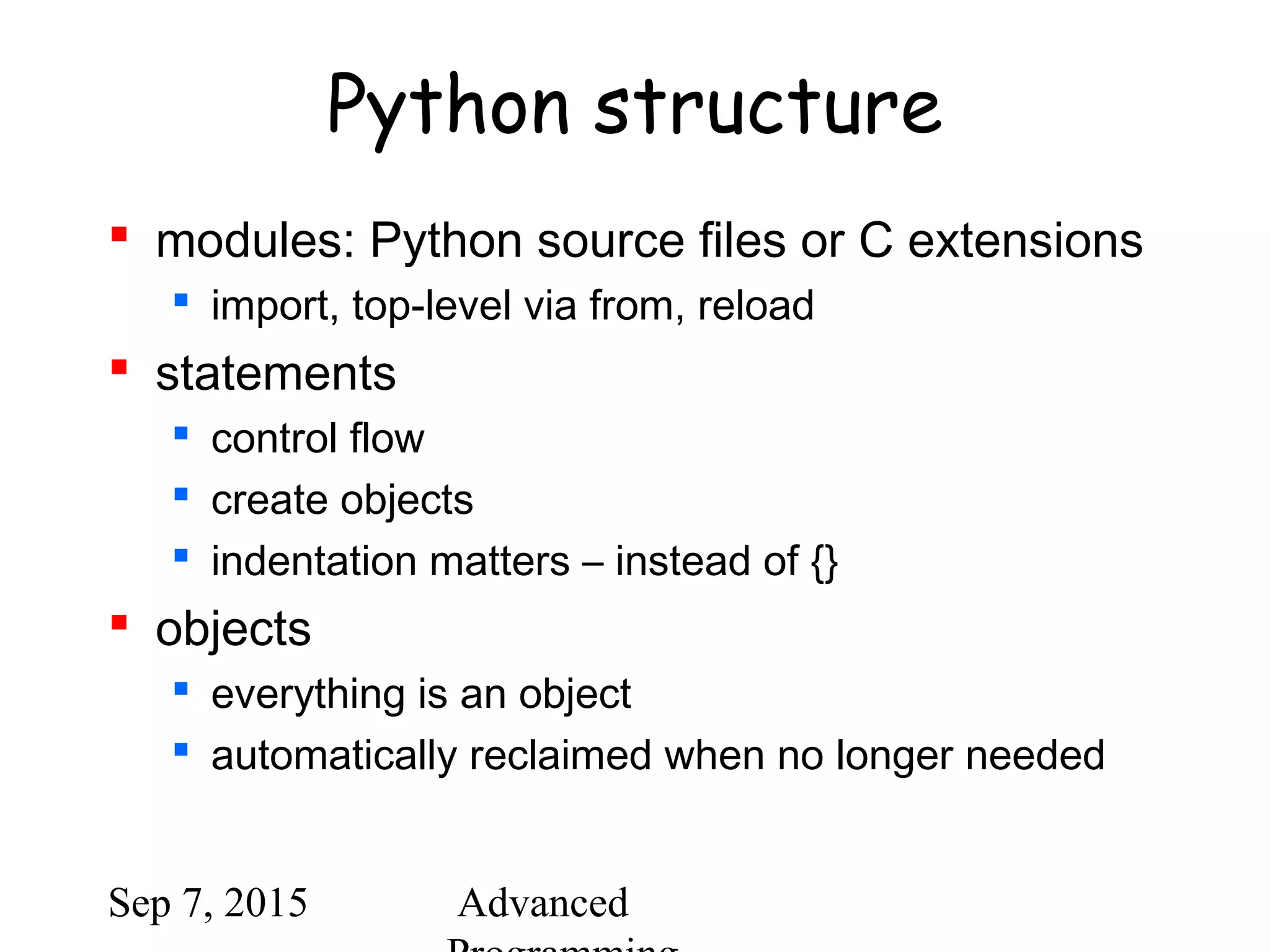
![Sep 7, 2015 Advanced
First example
#!/usr/local/bin/python
# import systems module
import sys
marker = '::::::'
for name in sys.argv[1:]:
input = open(name, 'r')
print marker + name
print input.read()](https://image.slidesharecdn.com/python-bb10da9e-c171-47c6-9bfc-577b4e9d0dd4-1201208930-150907064501-lva1-app6891/75/python-ppt-11-2048.jpg)
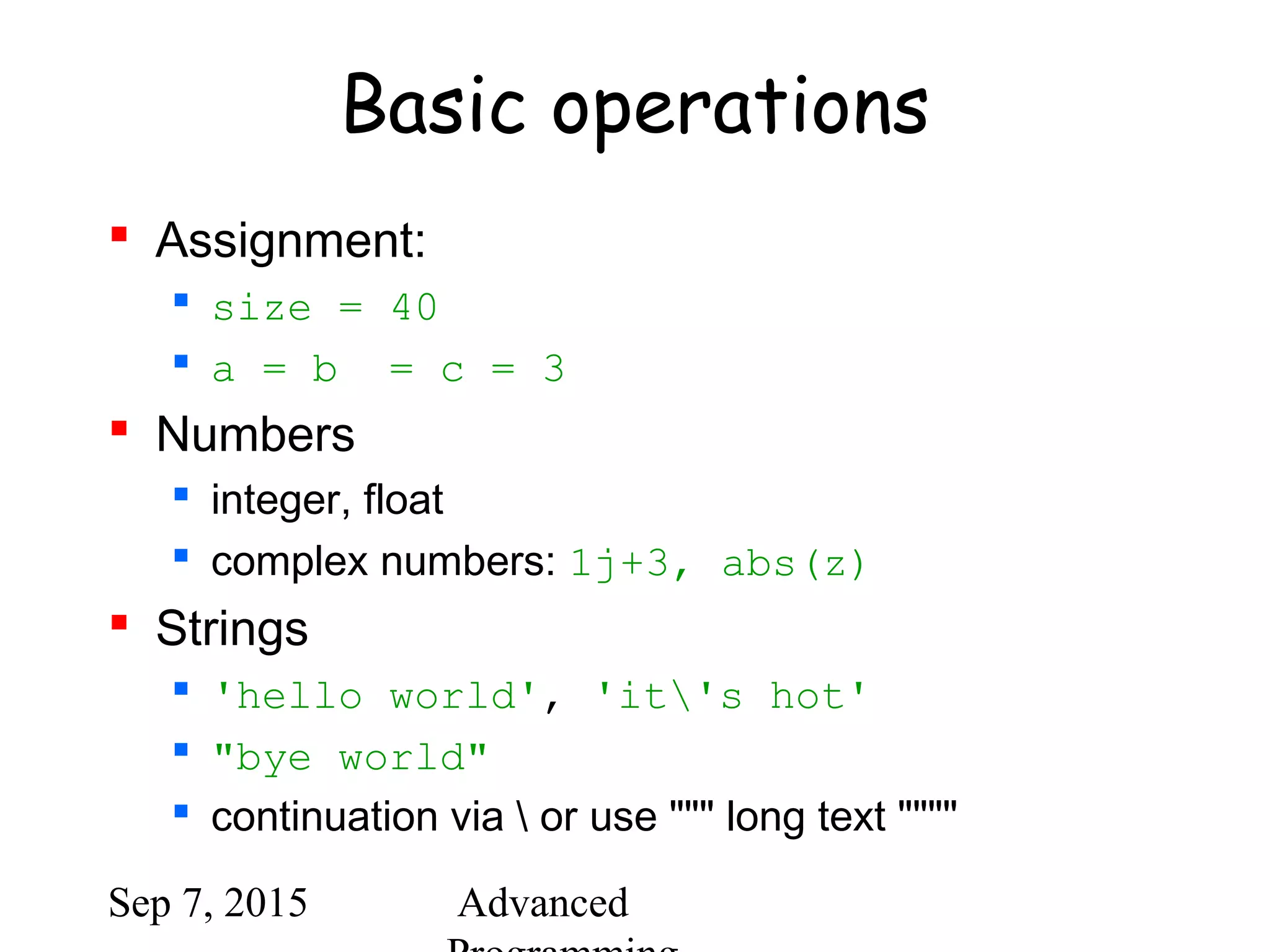
![Sep 7, 2015 Advanced
String operations
concatenate with + or neighbors
word = 'Help' + x
word = 'Help' 'a'
subscripting of strings
'Hello'[2] 'l'
slice: 'Hello'[1:2] 'el'
word[-1] last character
len(word) 5
immutable: cannot assign to subscript](https://image.slidesharecdn.com/python-bb10da9e-c171-47c6-9bfc-577b4e9d0dd4-1201208930-150907064501-lva1-app6891/75/python-ppt-13-2048.jpg)
![Sep 7, 2015 Advanced
Lists
lists can be heterogeneous
a = ['spam', 'eggs', 100, 1234, 2*2]
Lists can be indexed and sliced:
a[0] spam
a[:2] ['spam', 'eggs']
Lists can be manipulated
a[2] = a[2] + 23
a[0:2] = [1,12]
a[0:0] = []
len(a) 5](https://image.slidesharecdn.com/python-bb10da9e-c171-47c6-9bfc-577b4e9d0dd4-1201208930-150907064501-lva1-app6891/75/python-ppt-14-2048.jpg)
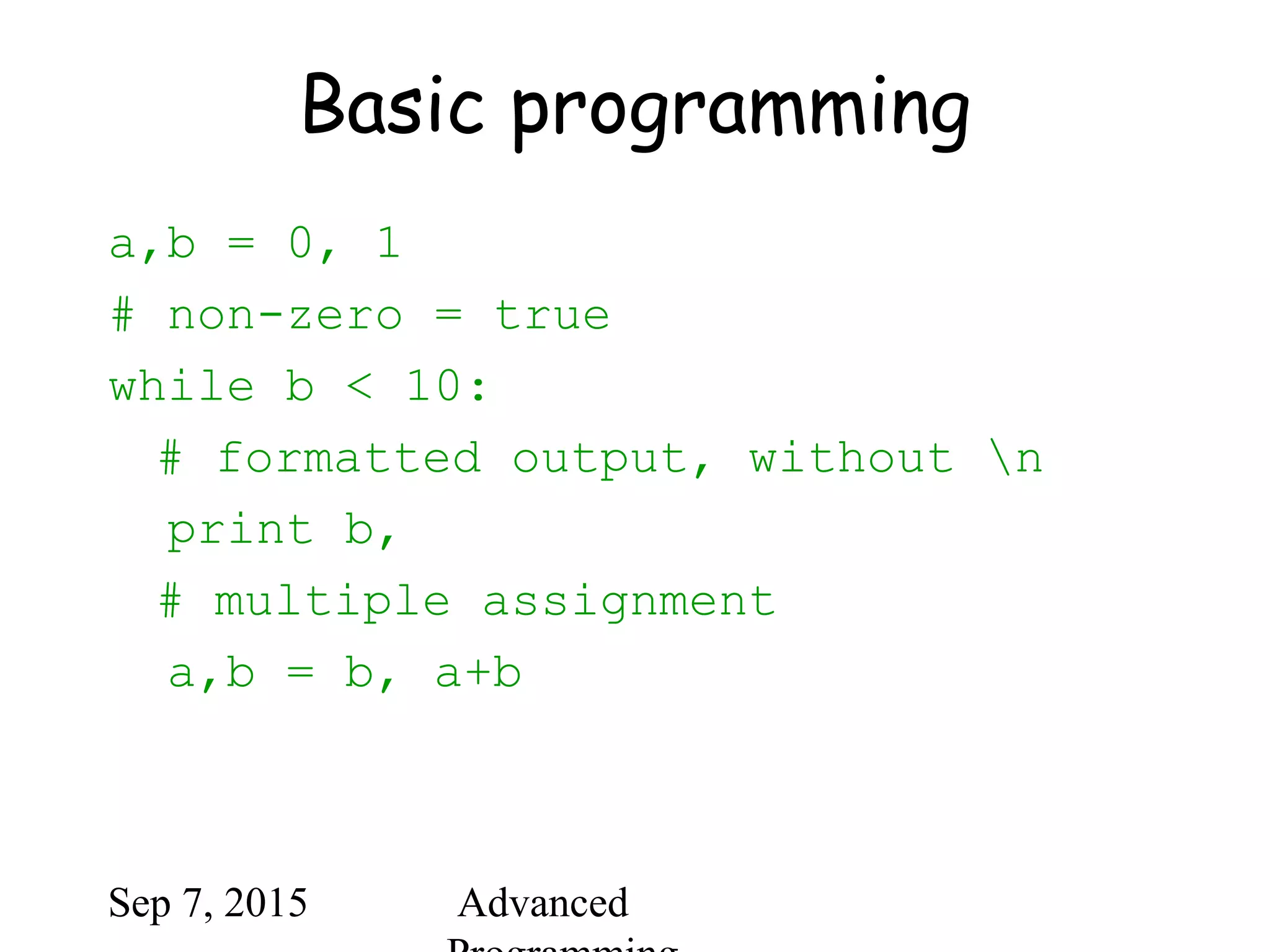
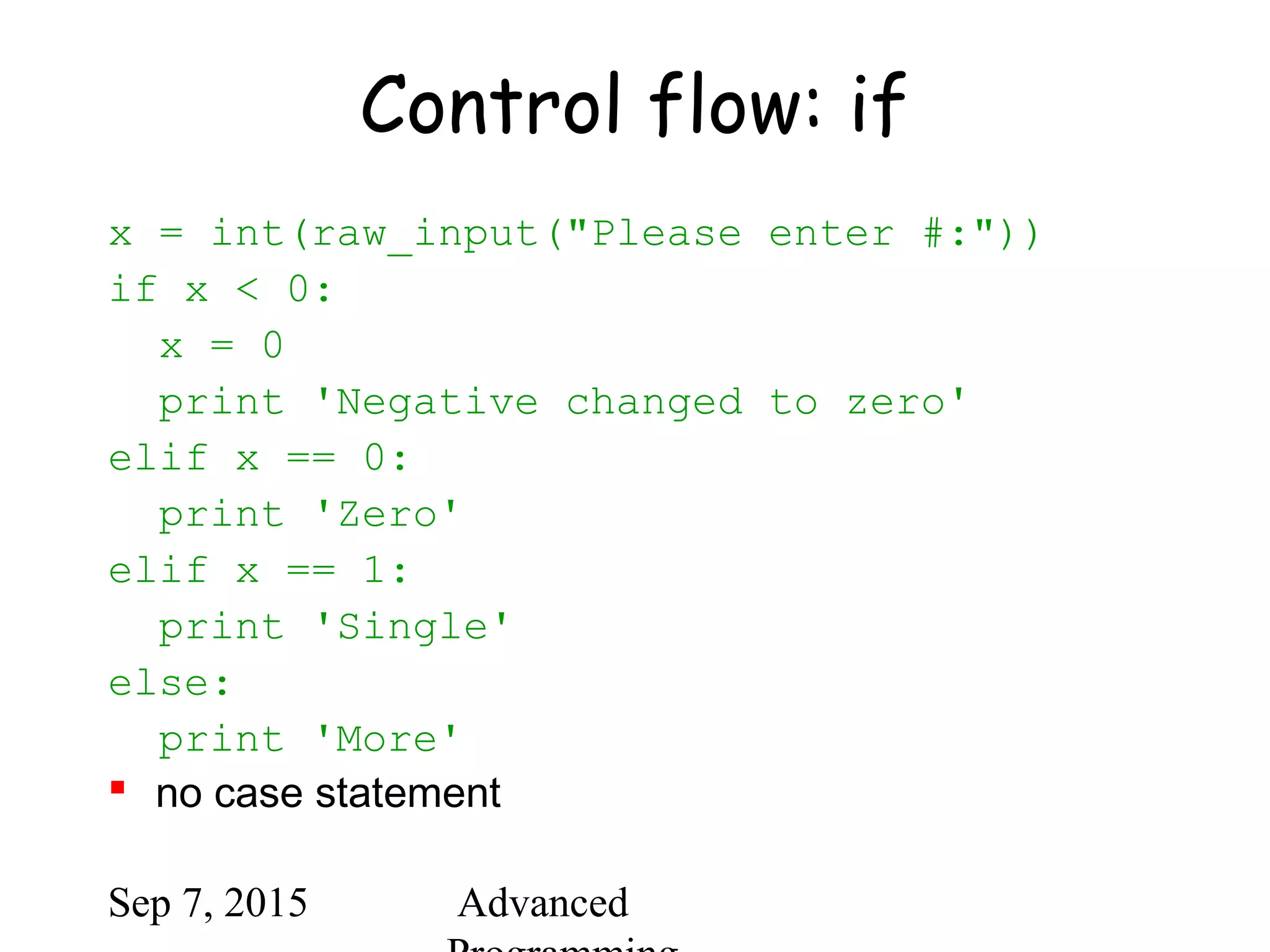
![Sep 7, 2015 Advanced
Control flow: for
a = ['cat', 'window', 'defenestrate']
for x in a:
print x, len(x)
no arithmetic progression, but
range(10) [0, 1, 2, 3, 4, 5, 6, 7, 8, 9]
for i in range(len(a)):
print i, a[i]
do not modify the sequence being iterated
over](https://image.slidesharecdn.com/python-bb10da9e-c171-47c6-9bfc-577b4e9d0dd4-1201208930-150907064501-lva1-app6891/75/python-ppt-17-2048.jpg)
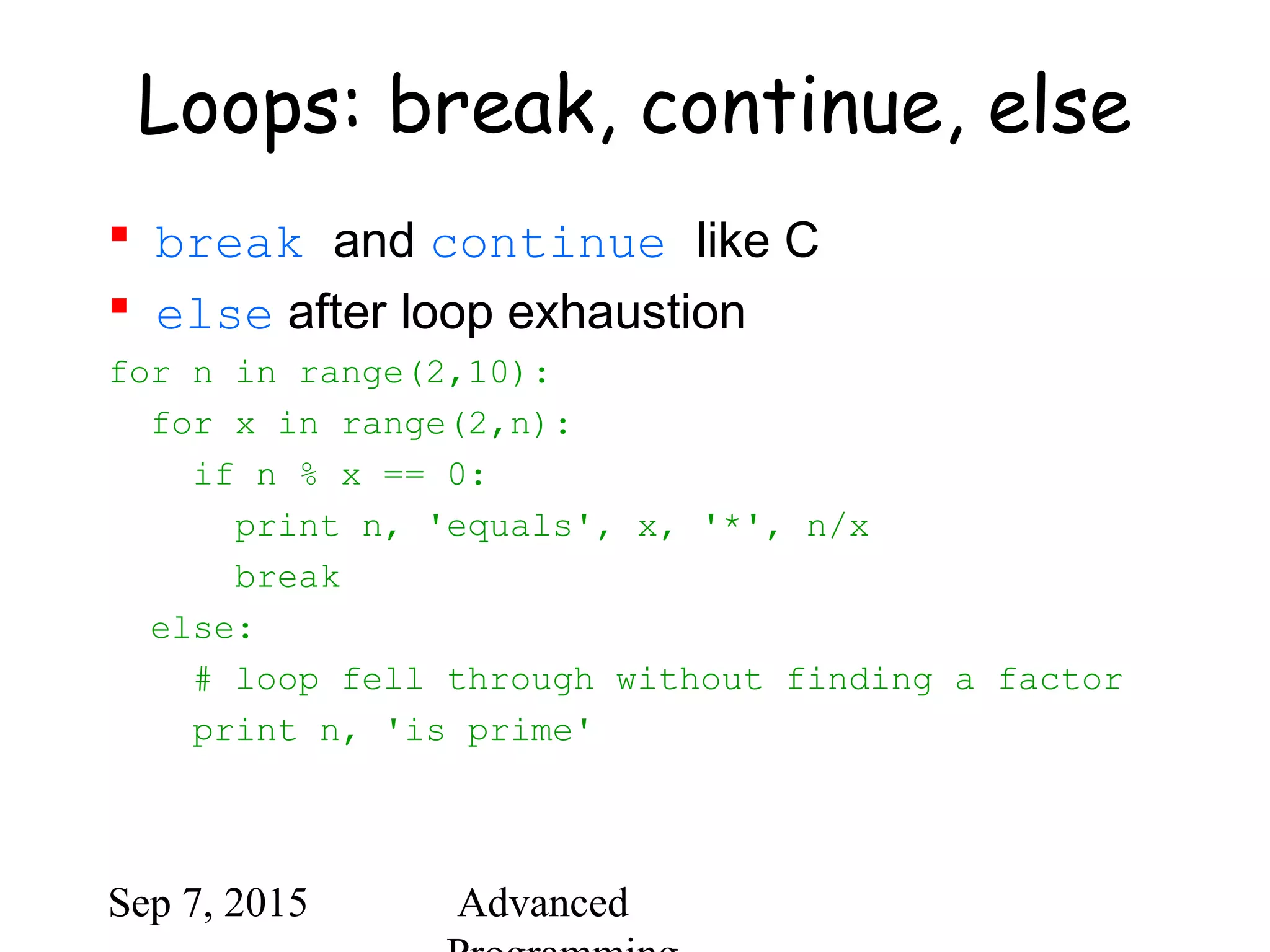
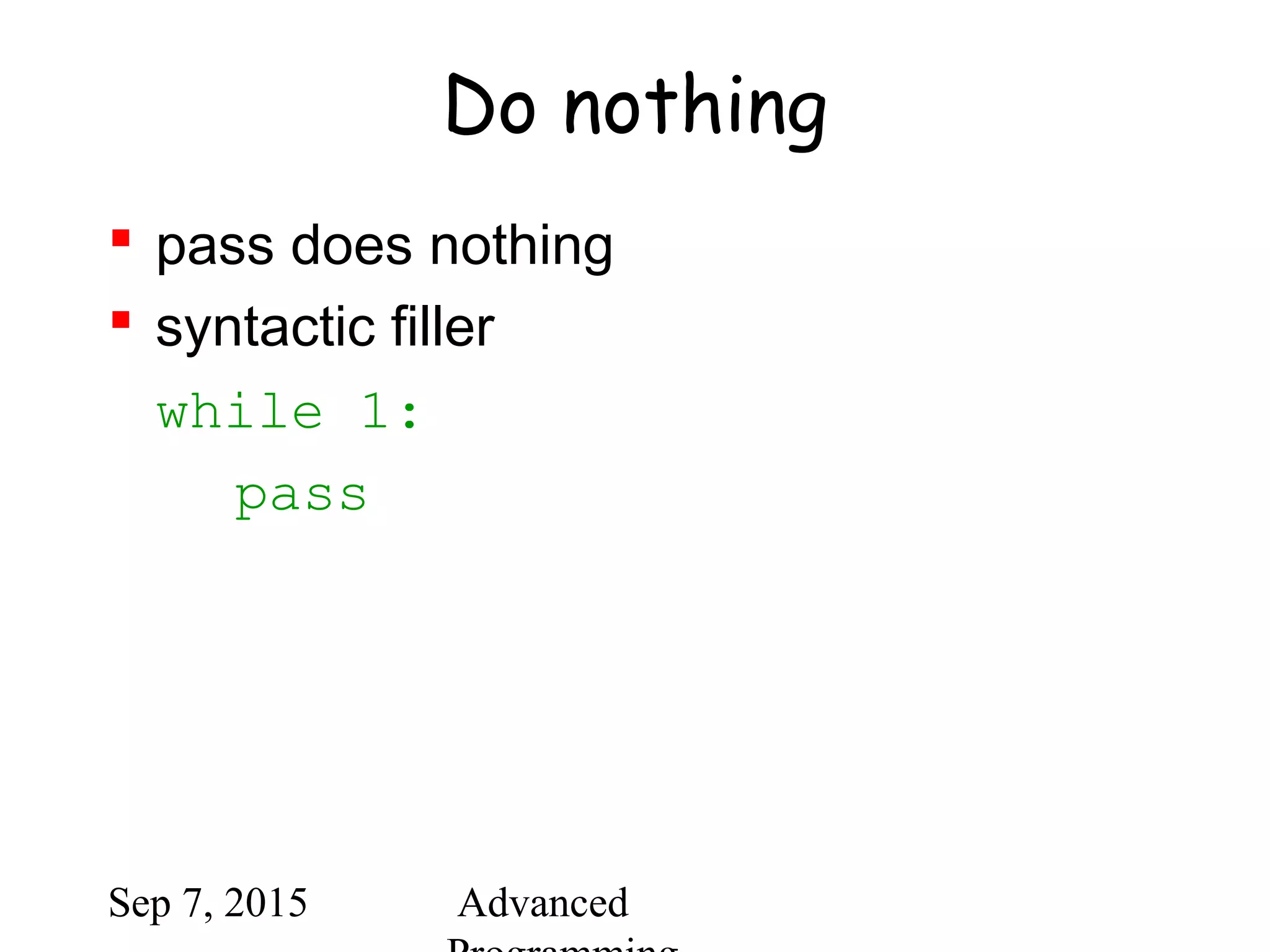
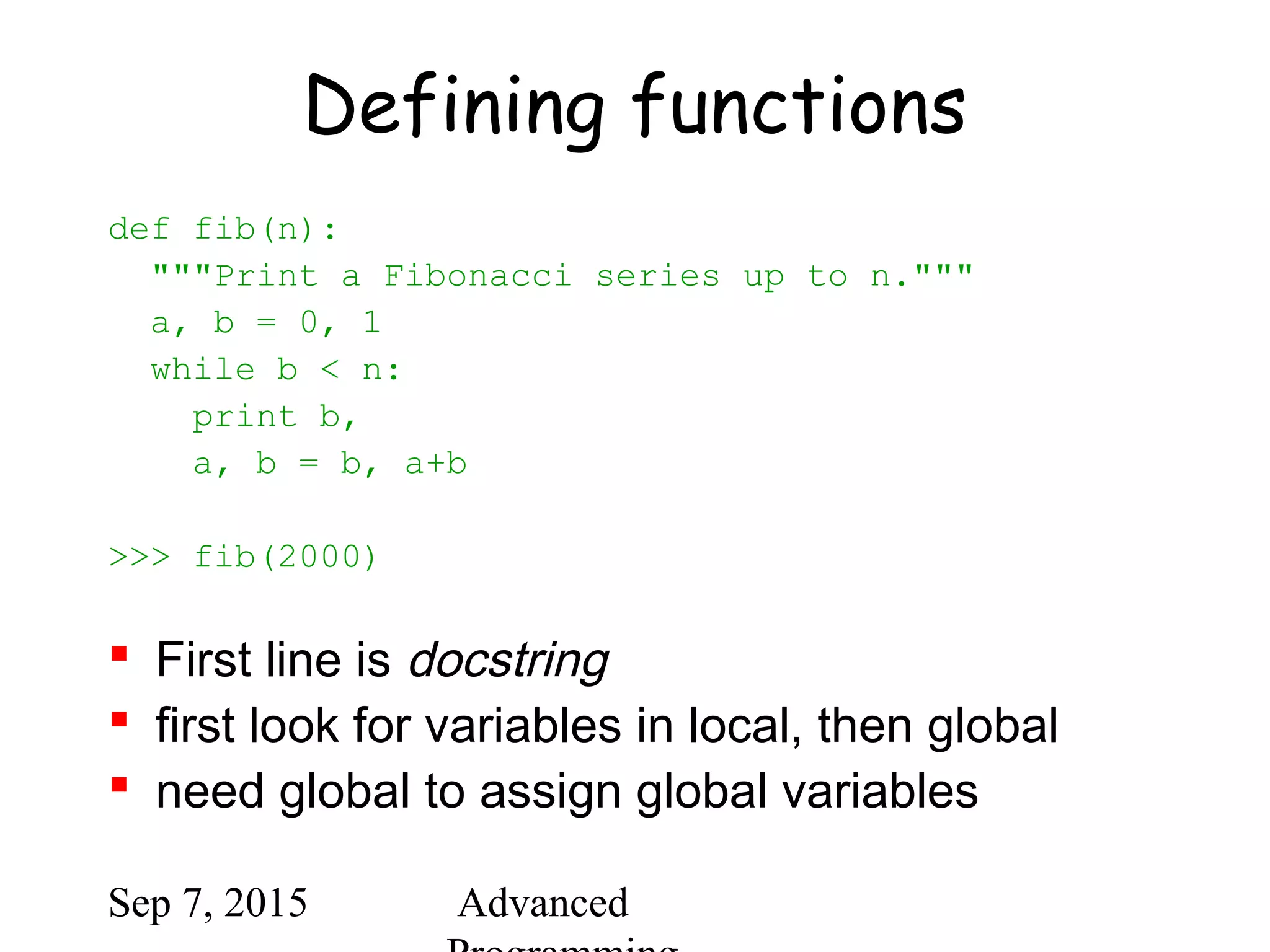
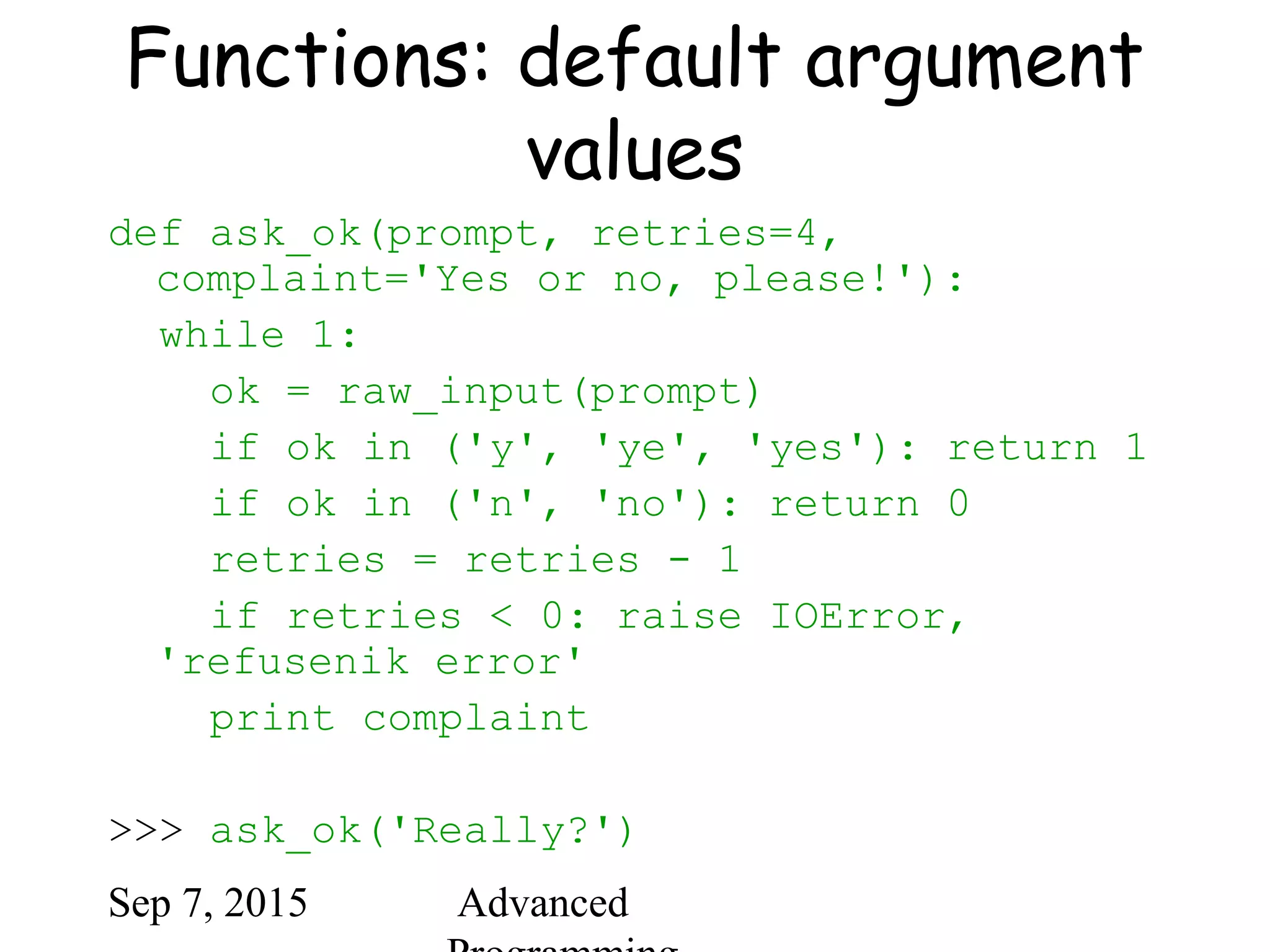
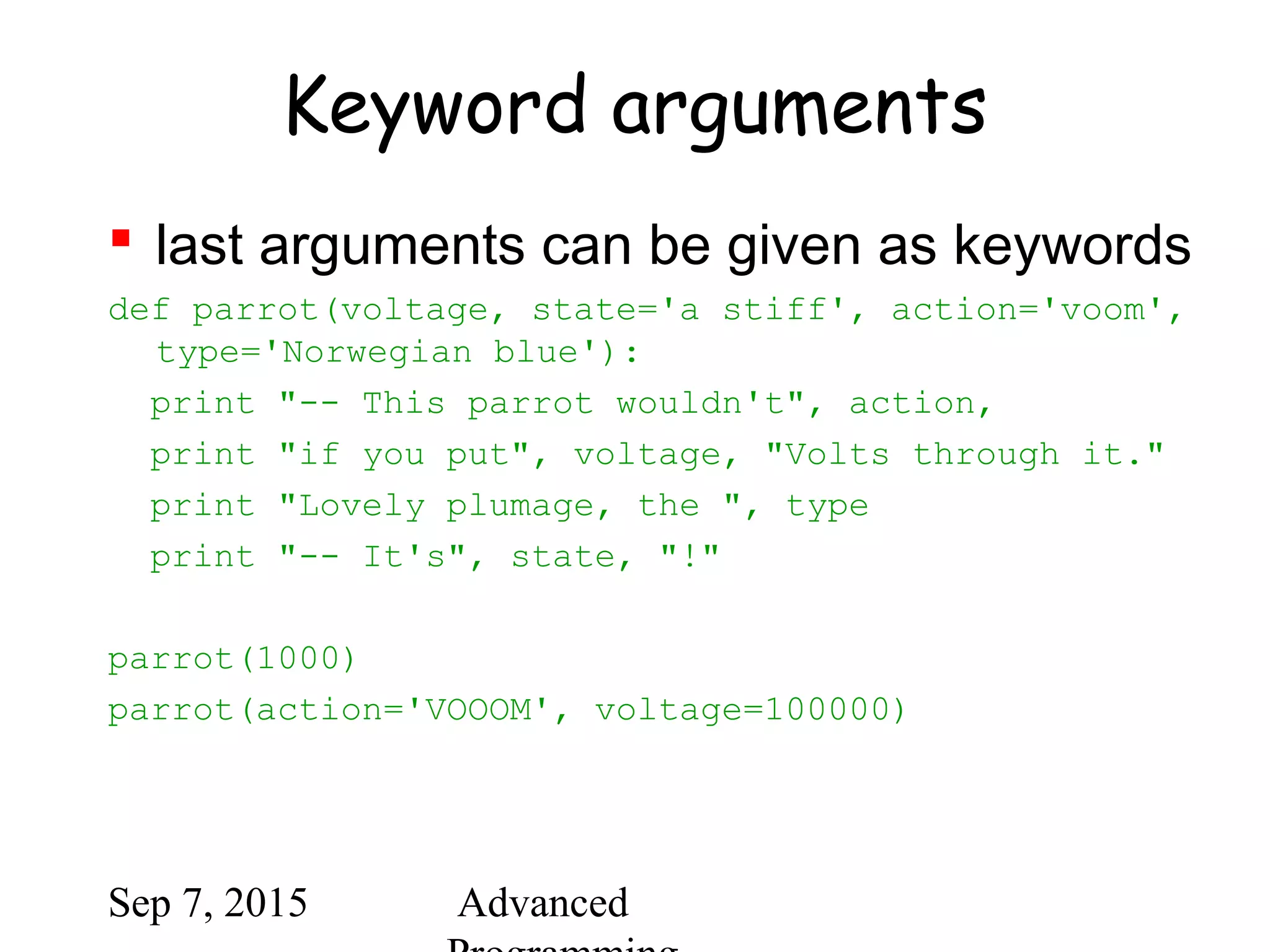
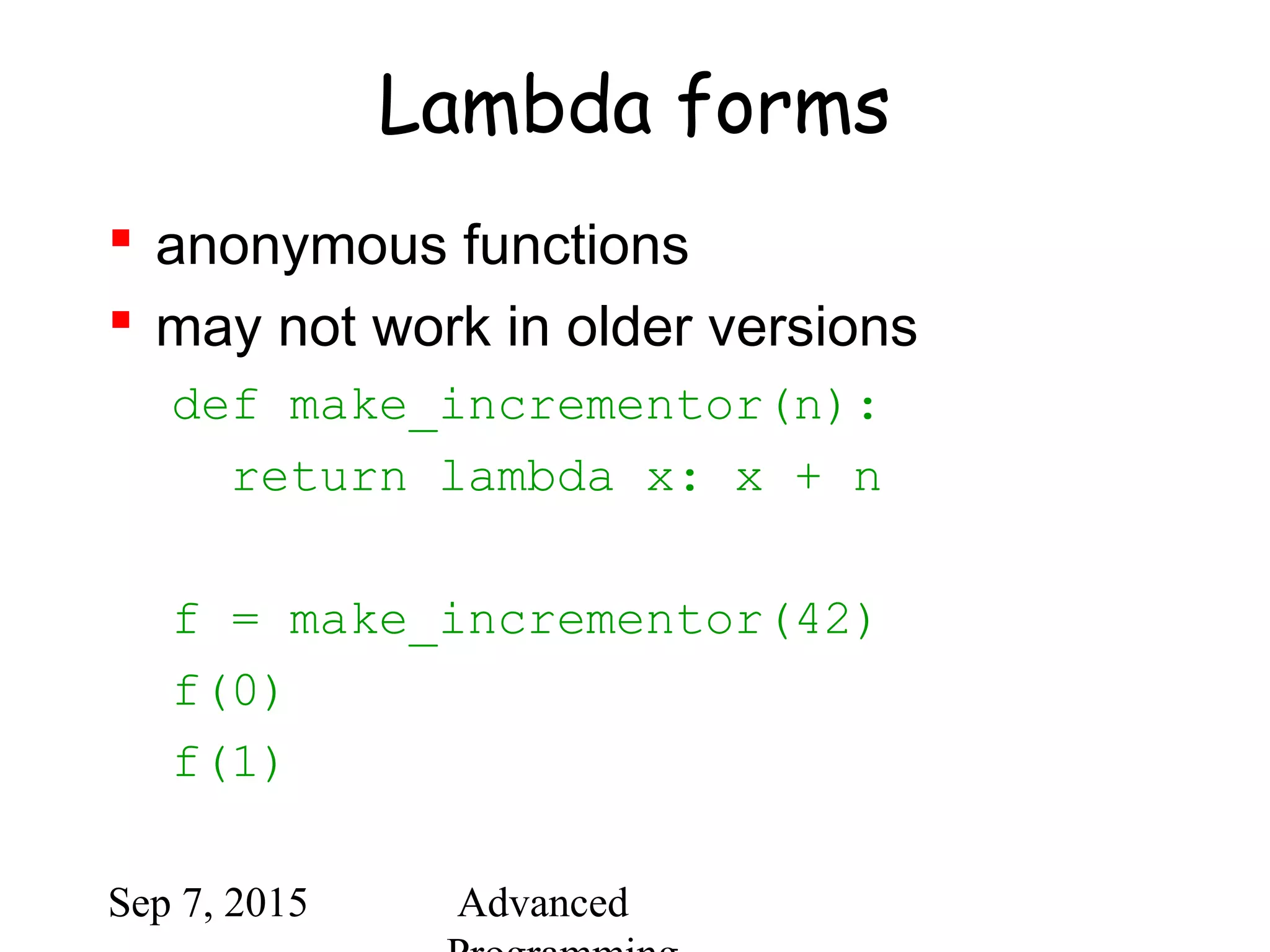
![Sep 7, 2015 Advanced
List methods
append(x)
extend(L)
append all items in list (like Tcl lappend)
insert(i,x)
remove(x)
pop([i]), pop()
create stack (FIFO), or queue (LIFO) pop(0)
index(x)
return the index for value x](https://image.slidesharecdn.com/python-bb10da9e-c171-47c6-9bfc-577b4e9d0dd4-1201208930-150907064501-lva1-app6891/75/python-ppt-24-2048.jpg)
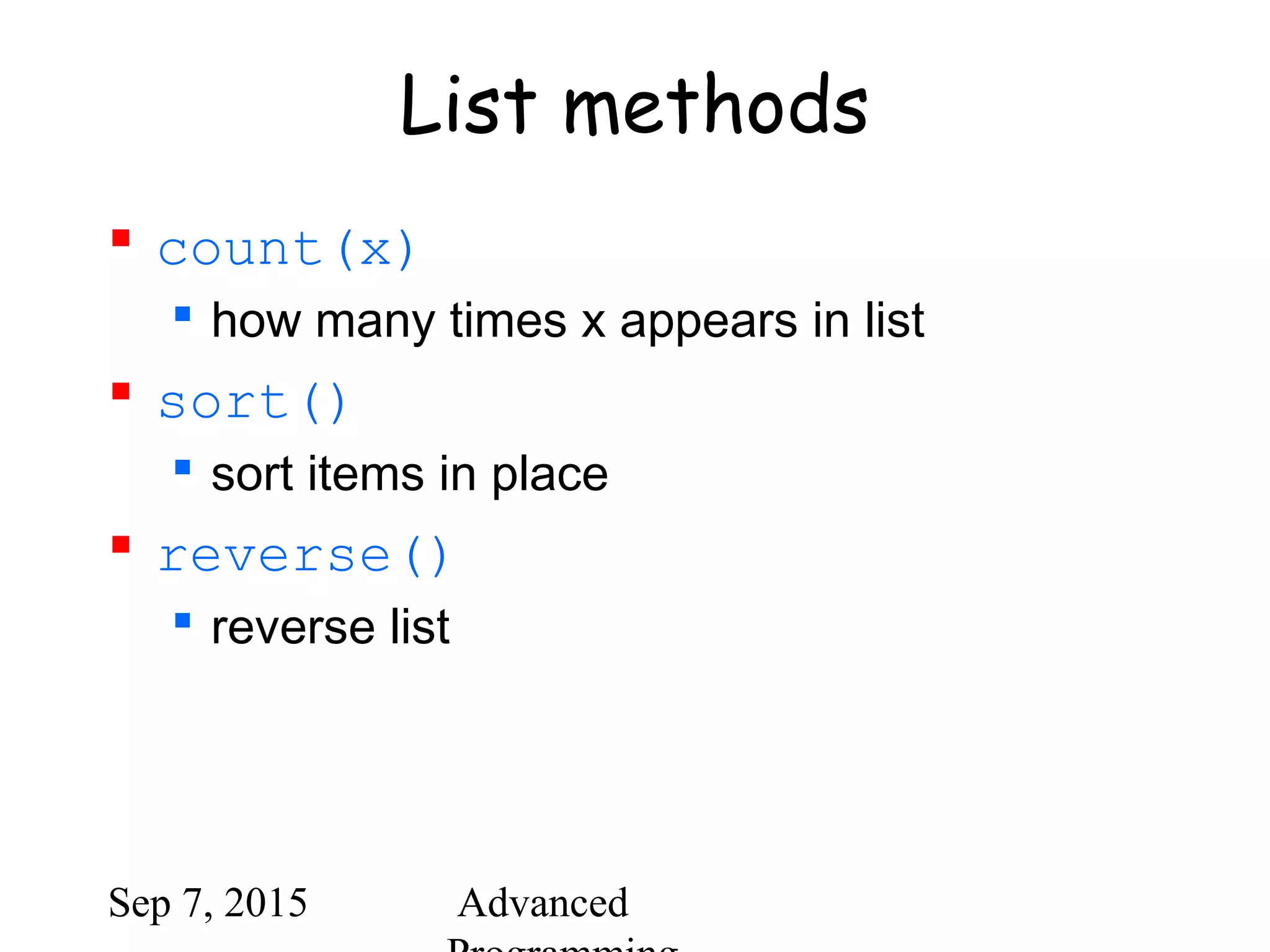
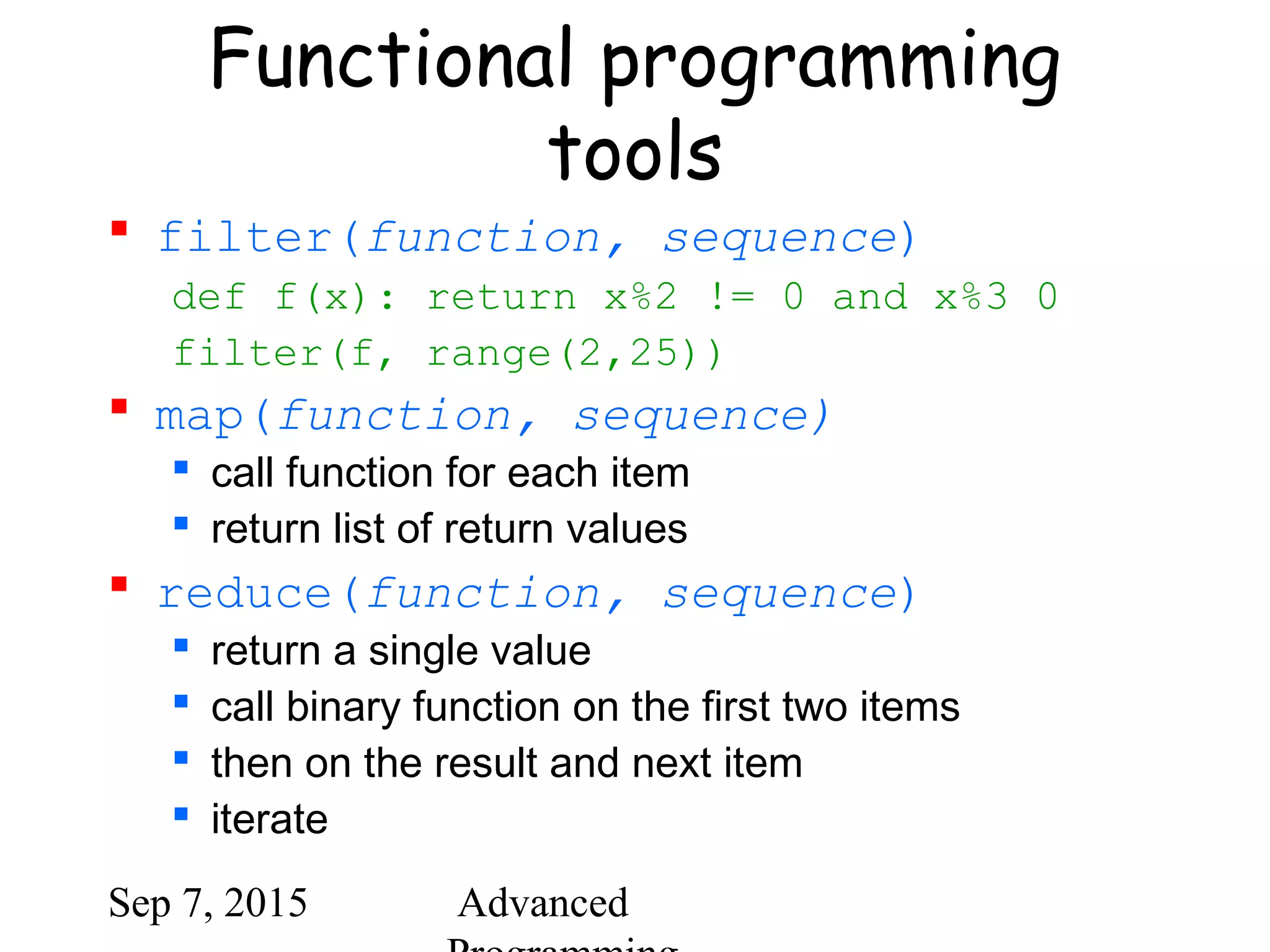
![Sep 7, 2015 Advanced
List comprehensions (2.0)
Create lists without map(),
filter(), lambda
= expression followed by for clause +
zero or more for or of clauses
>>> vec = [2,4,6]
>>> [3*x for x in vec]
[6, 12, 18]
>>> [{x: x**2} for x in vec}
[{2: 4}, {4: 16}, {6: 36}]](https://image.slidesharecdn.com/python-bb10da9e-c171-47c6-9bfc-577b4e9d0dd4-1201208930-150907064501-lva1-app6891/75/python-ppt-27-2048.jpg)
![Sep 7, 2015 Advanced
List comprehensions
cross products:
>>> vec1 = [2,4,6]
>>> vec2 = [4,3,-9]
>>> [x*y for x in vec1 for y in vec2]
[8,6,-18, 16,12,-36, 24,18,-54]
>>> [x+y for x in vec1 and y in vec2]
[6,5,-7,8,7,-5,10,9,-3]
>>> [vec1[i]*vec2[i] for i in
range(len(vec1))]
[8,12,-54]](https://image.slidesharecdn.com/python-bb10da9e-c171-47c6-9bfc-577b4e9d0dd4-1201208930-150907064501-lva1-app6891/75/python-ppt-28-2048.jpg)
![Sep 7, 2015 Advanced
List comprehensions
can also use if:
>>> [3*x for x in vec if x > 3]
[12, 18]
>>> [3*x for x in vec if x < 2]
[]](https://image.slidesharecdn.com/python-bb10da9e-c171-47c6-9bfc-577b4e9d0dd4-1201208930-150907064501-lva1-app6891/75/python-ppt-29-2048.jpg)
![Sep 7, 2015 Advanced
del – removing list items
remove by index, not value
remove slices from list (rather than by
assigning an empty list)
>>> a = [-1,1,66.6,333,333,1234.5]
>>> del a[0]
>>> a
[1,66.6,333,333,1234.5]
>>> del a[2:4]
>>> a
[1,66.6,1234.5]](https://image.slidesharecdn.com/python-bb10da9e-c171-47c6-9bfc-577b4e9d0dd4-1201208930-150907064501-lva1-app6891/75/python-ppt-30-2048.jpg)
![Sep 7, 2015 Advanced
Tuples and sequences
lists, strings, tuples: examples of
sequence type
tuple = values separated by commas
>>> t = 123, 543, 'bar'
>>> t[0]
123
>>> t
(123, 543, 'bar')](https://image.slidesharecdn.com/python-bb10da9e-c171-47c6-9bfc-577b4e9d0dd4-1201208930-150907064501-lva1-app6891/75/python-ppt-31-2048.jpg)
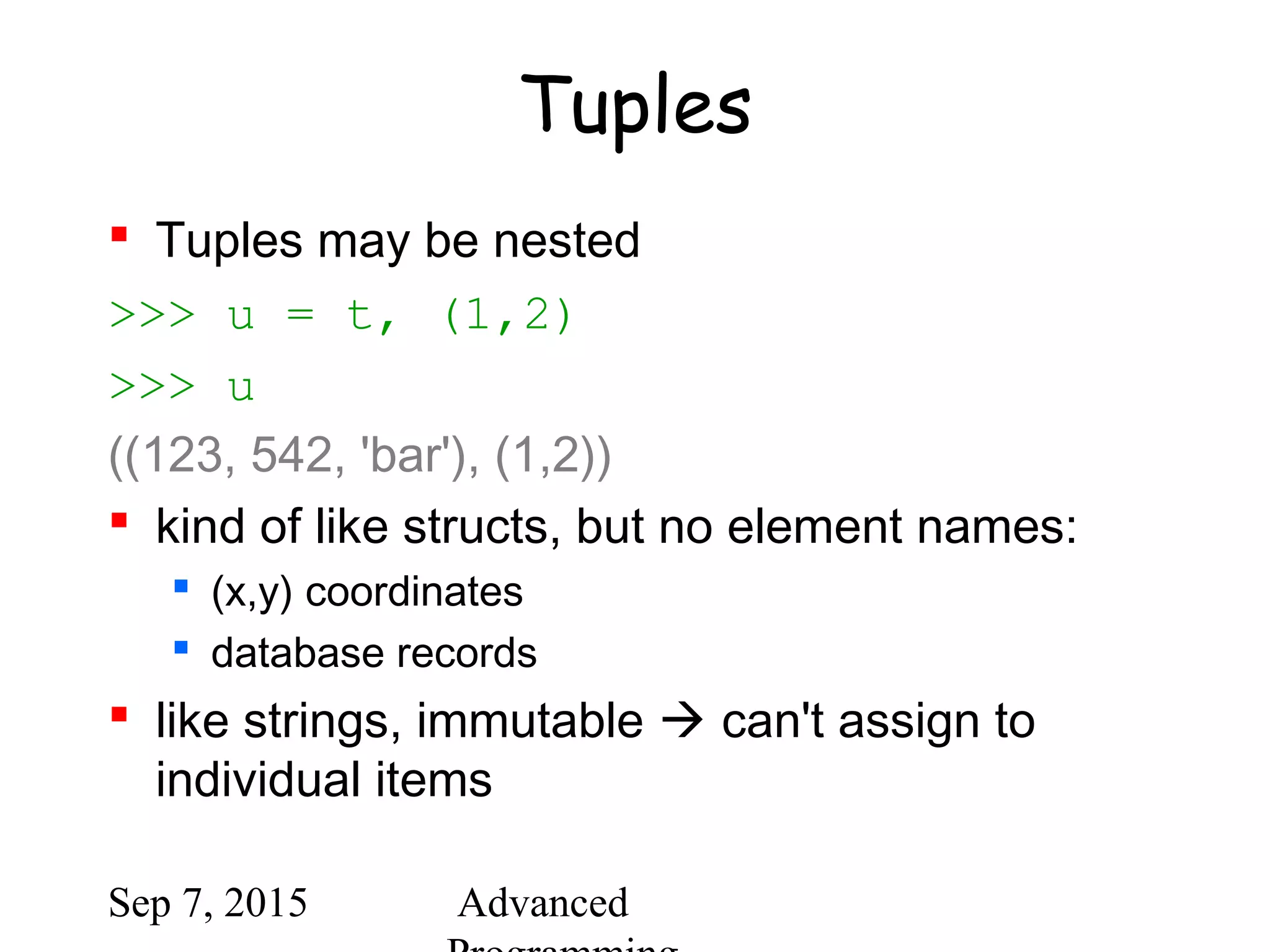
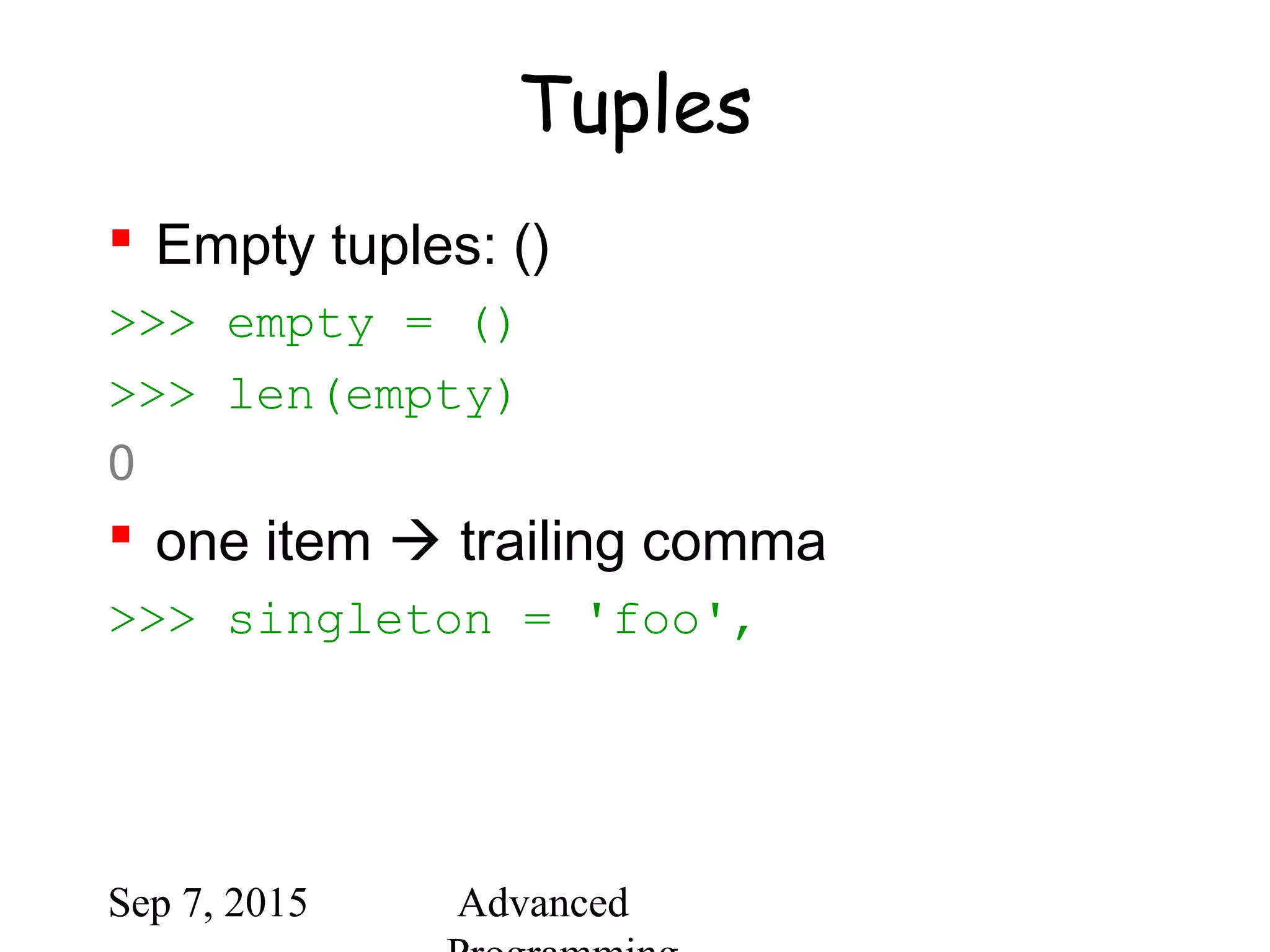
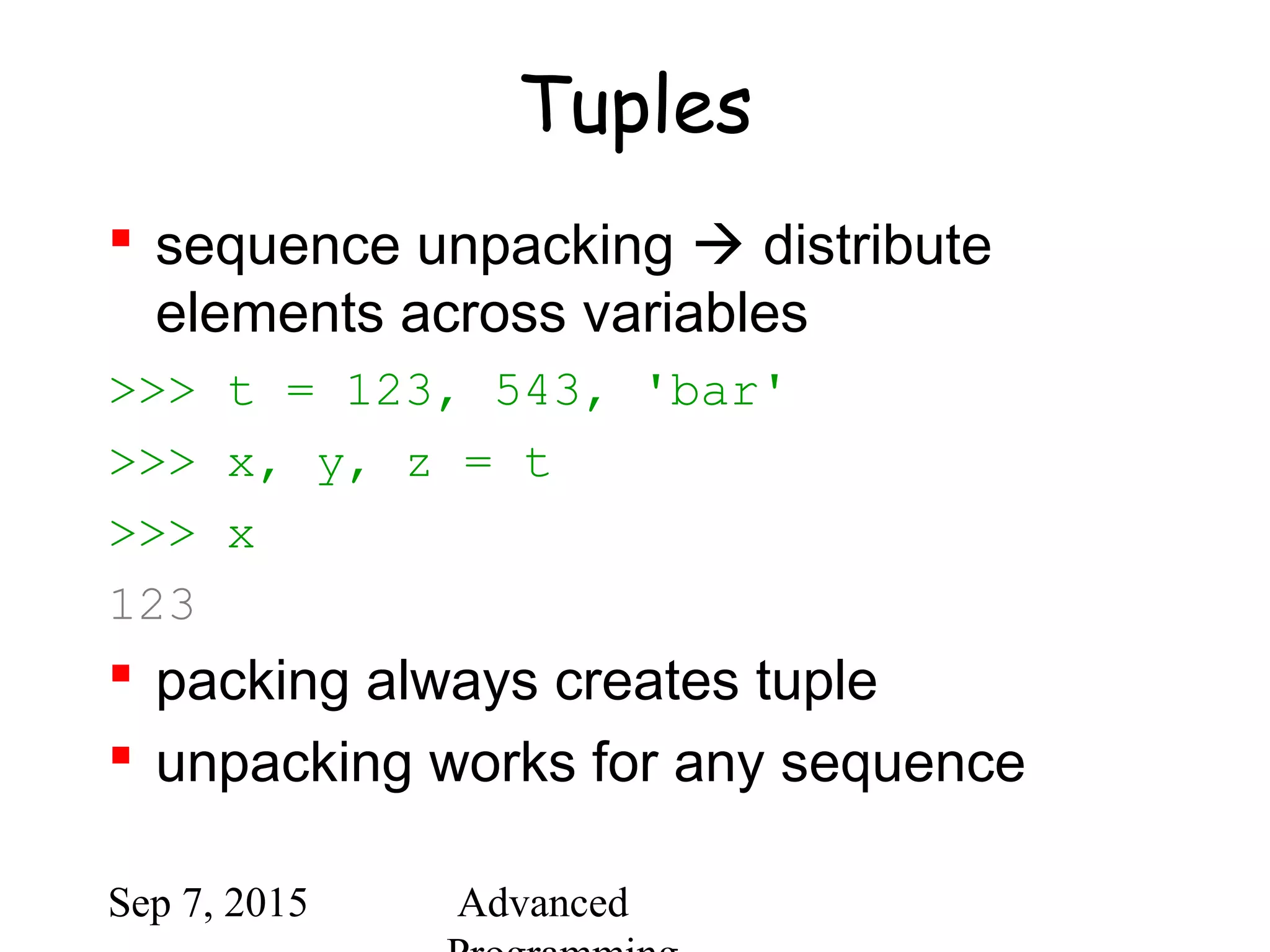
![Sep 7, 2015 Advanced
Dictionaries
like Tcl or awk associative arrays
indexed by keys
keys are any immutable type: e.g., tuples
but not lists (mutable!)
uses 'key: value' notation
>>> tel = {'hgs' : 7042, 'lennox': 7018}
>>> tel['cs'] = 7000
>>> tel](https://image.slidesharecdn.com/python-bb10da9e-c171-47c6-9bfc-577b4e9d0dd4-1201208930-150907064501-lva1-app6891/75/python-ppt-35-2048.jpg)
![Sep 7, 2015 Advanced
Dictionaries
no particular order
delete elements with del
>>> del tel['foo']
keys() method unsorted list of keys
>>> tel.keys()
['cs', 'lennox', 'hgs']
use has_key() to check for existence
>>> tel.has_key('foo')
0](https://image.slidesharecdn.com/python-bb10da9e-c171-47c6-9bfc-577b4e9d0dd4-1201208930-150907064501-lva1-app6891/75/python-ppt-36-2048.jpg)
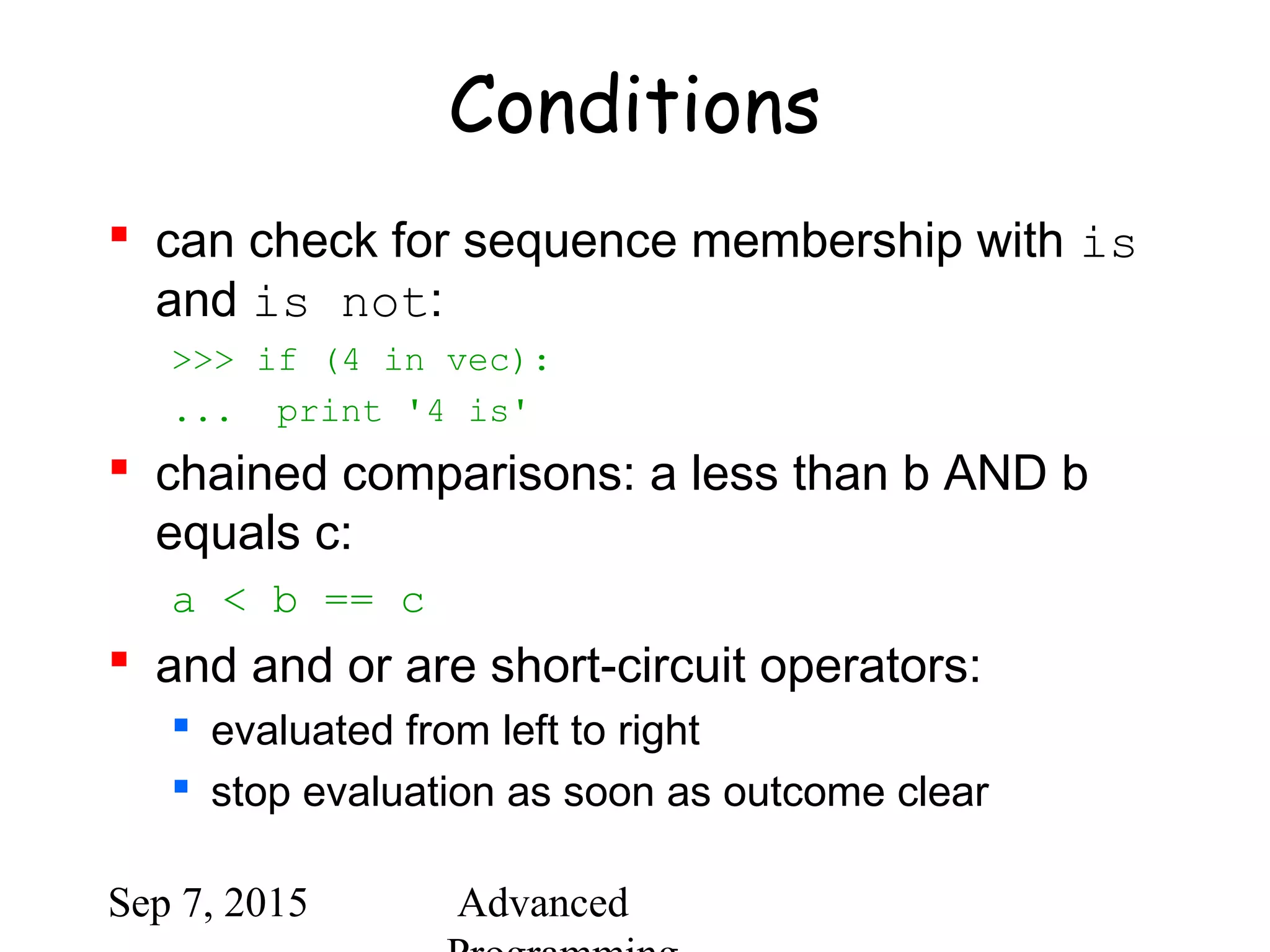
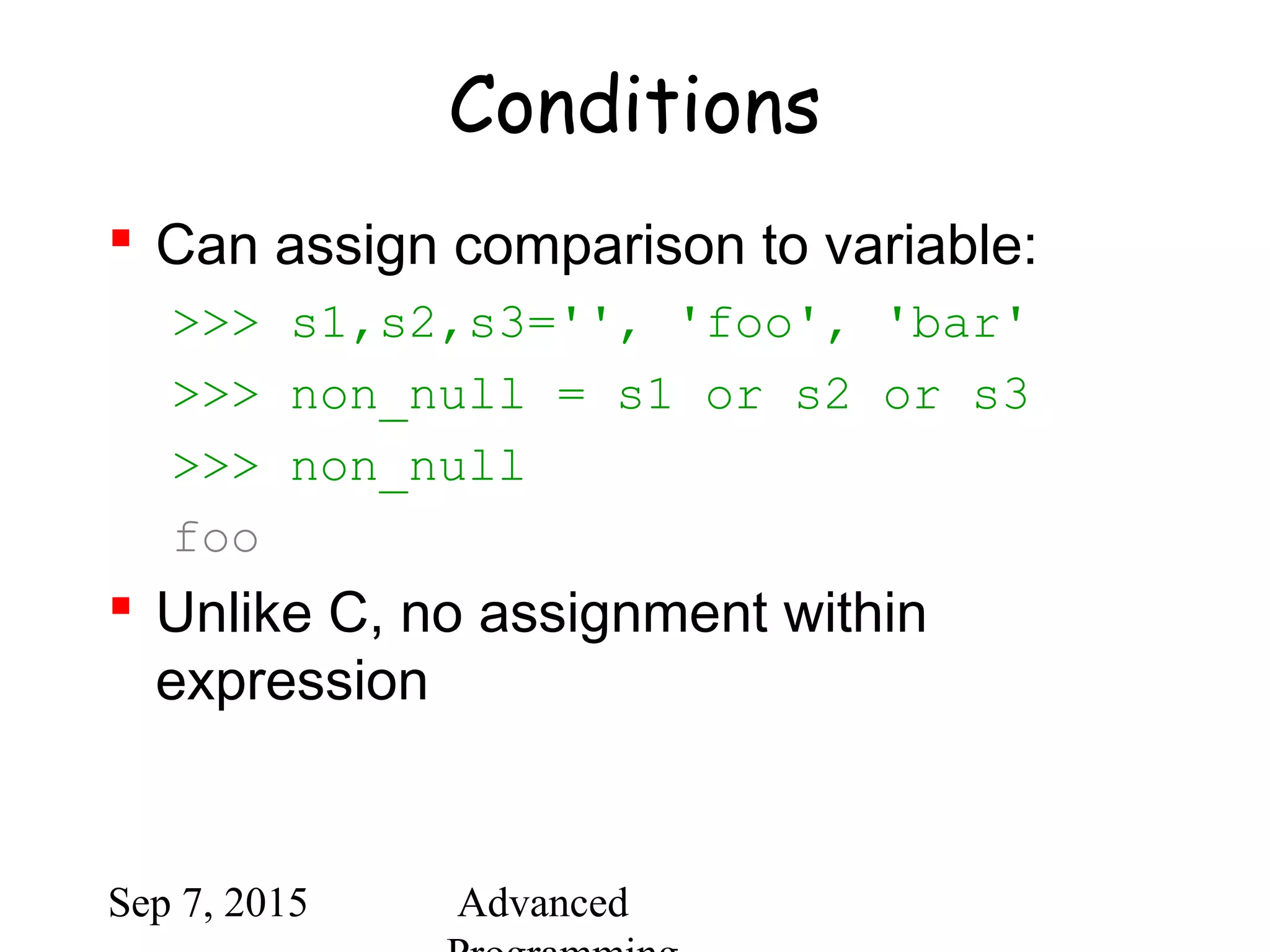
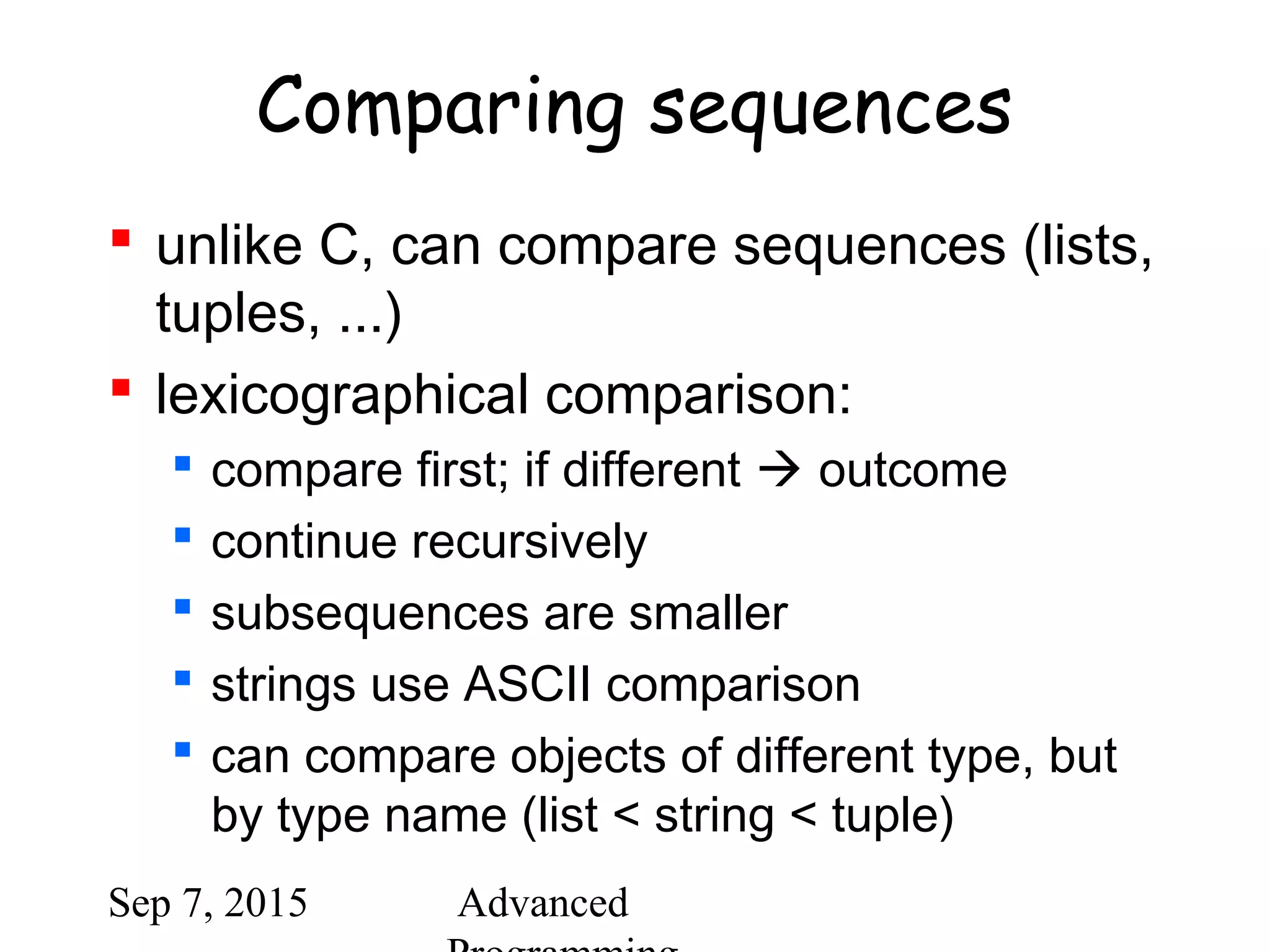
![Sep 7, 2015 Advanced
Comparing sequences
(1,2,3) < (1,2,4)
[1,2,3] < [1,2,4]
'ABC' < 'C' < 'Pascal' < 'Python'
(1,2,3) == (1.0,2.0,3.0)
(1,2) < (1,2,-1)](https://image.slidesharecdn.com/python-bb10da9e-c171-47c6-9bfc-577b4e9d0dd4-1201208930-150907064501-lva1-app6891/75/python-ppt-40-2048.jpg)
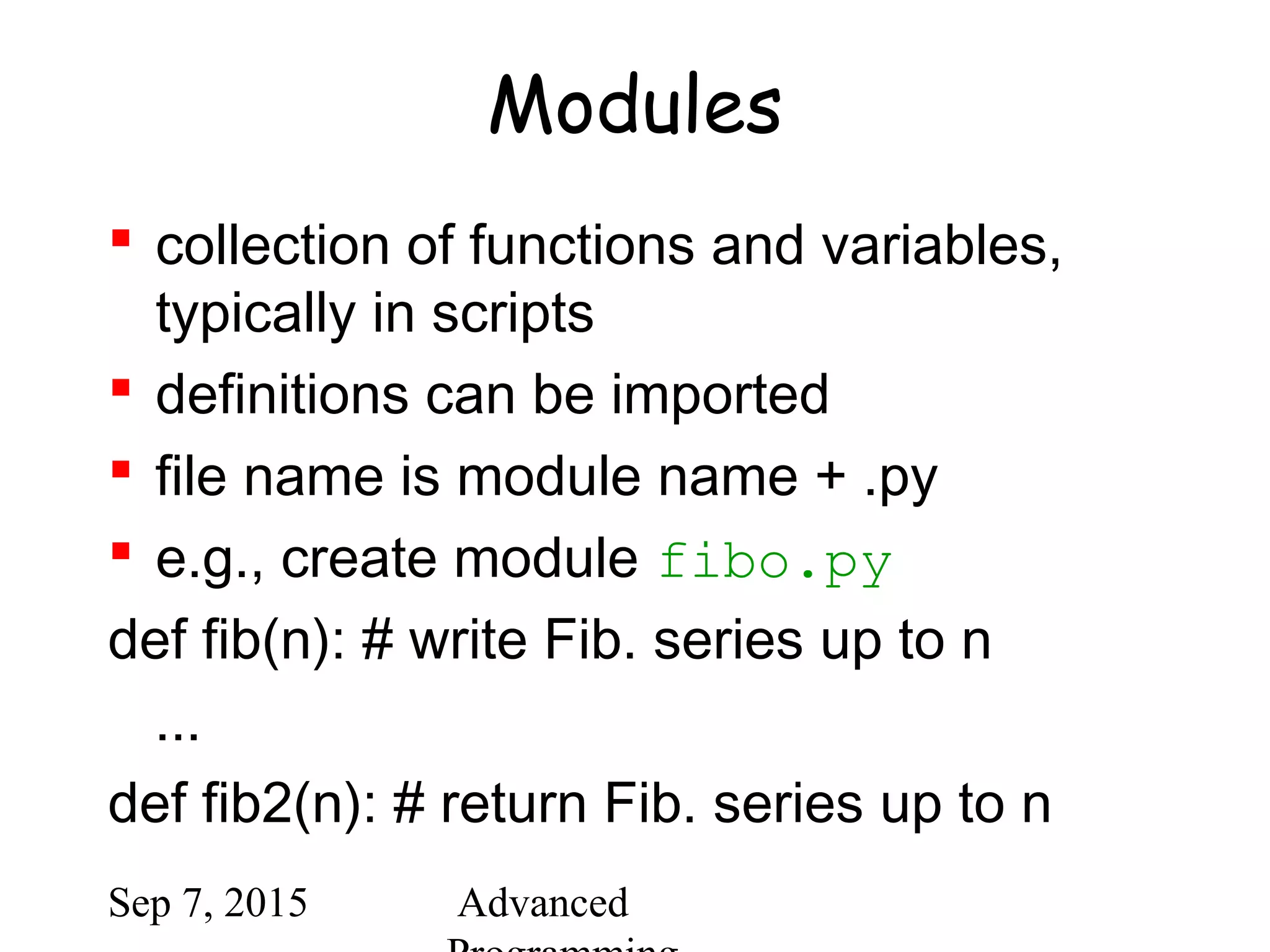
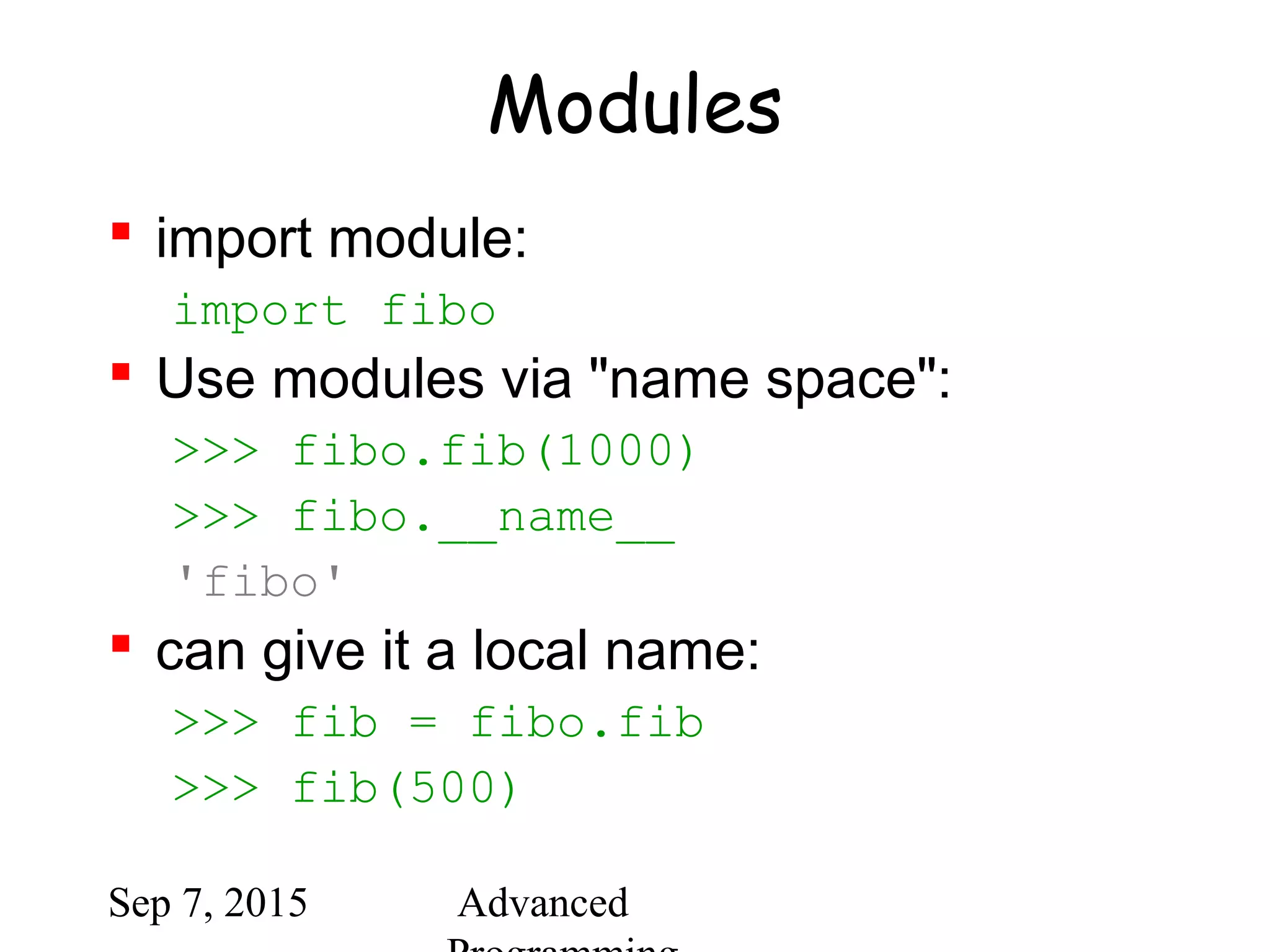
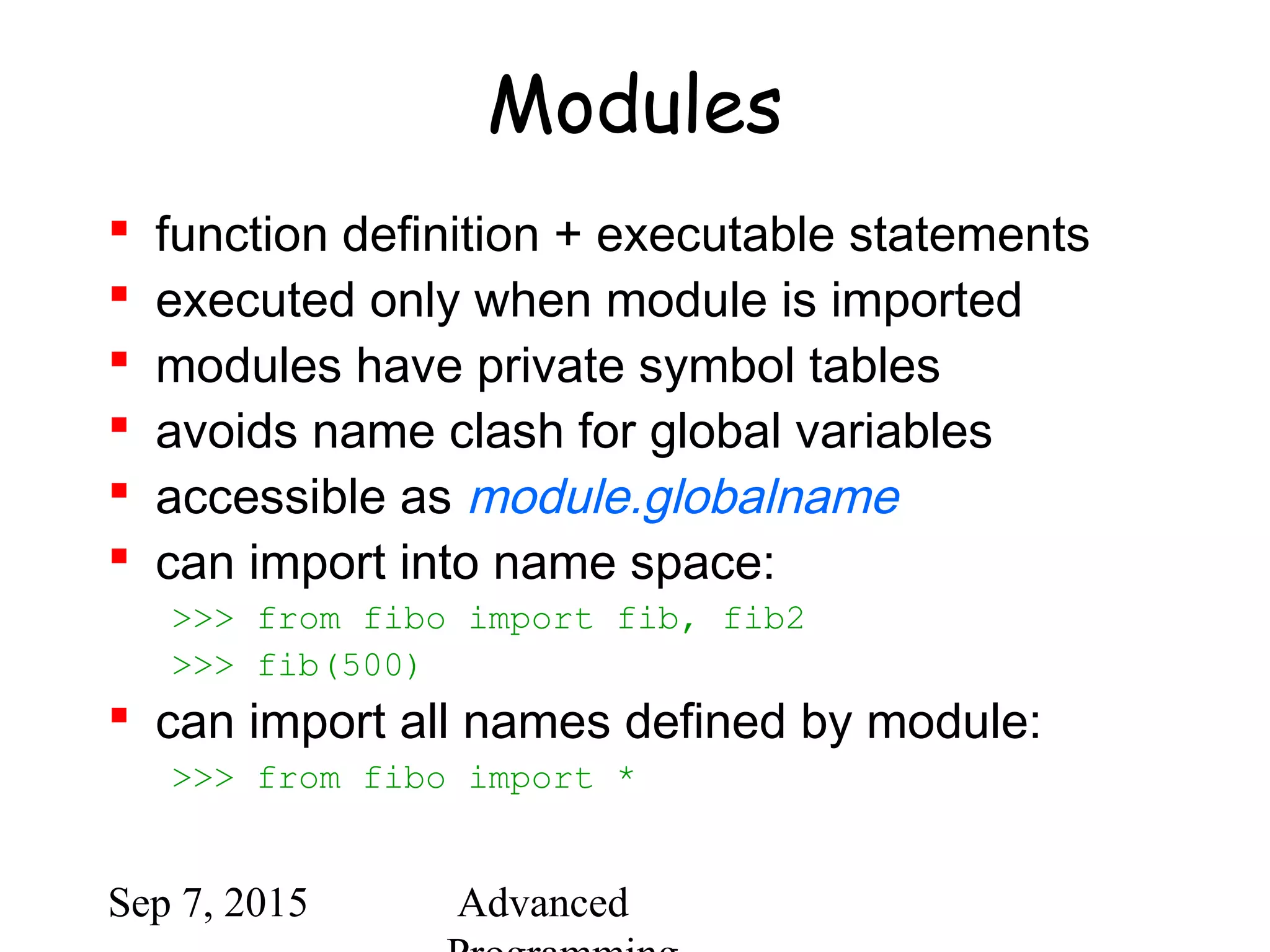
![Sep 7, 2015 Advanced
Module search path
current directory
list of directories specified in PYTHONPATH
environment variable
uses installation-default if not defined, e.g.,
.:/usr/local/lib/python
uses sys.path
>>> import sys
>>> sys.path
['', 'C:PROGRA~1Python2.2', 'C:Program
FilesPython2.2DLLs', 'C:Program
FilesPython2.2lib', 'C:Program
FilesPython2.2liblib-tk', 'C:Program
FilesPython2.2', 'C:Program FilesPython2.2libsite-
packages']](https://image.slidesharecdn.com/python-bb10da9e-c171-47c6-9bfc-577b4e9d0dd4-1201208930-150907064501-lva1-app6891/75/python-ppt-44-2048.jpg)
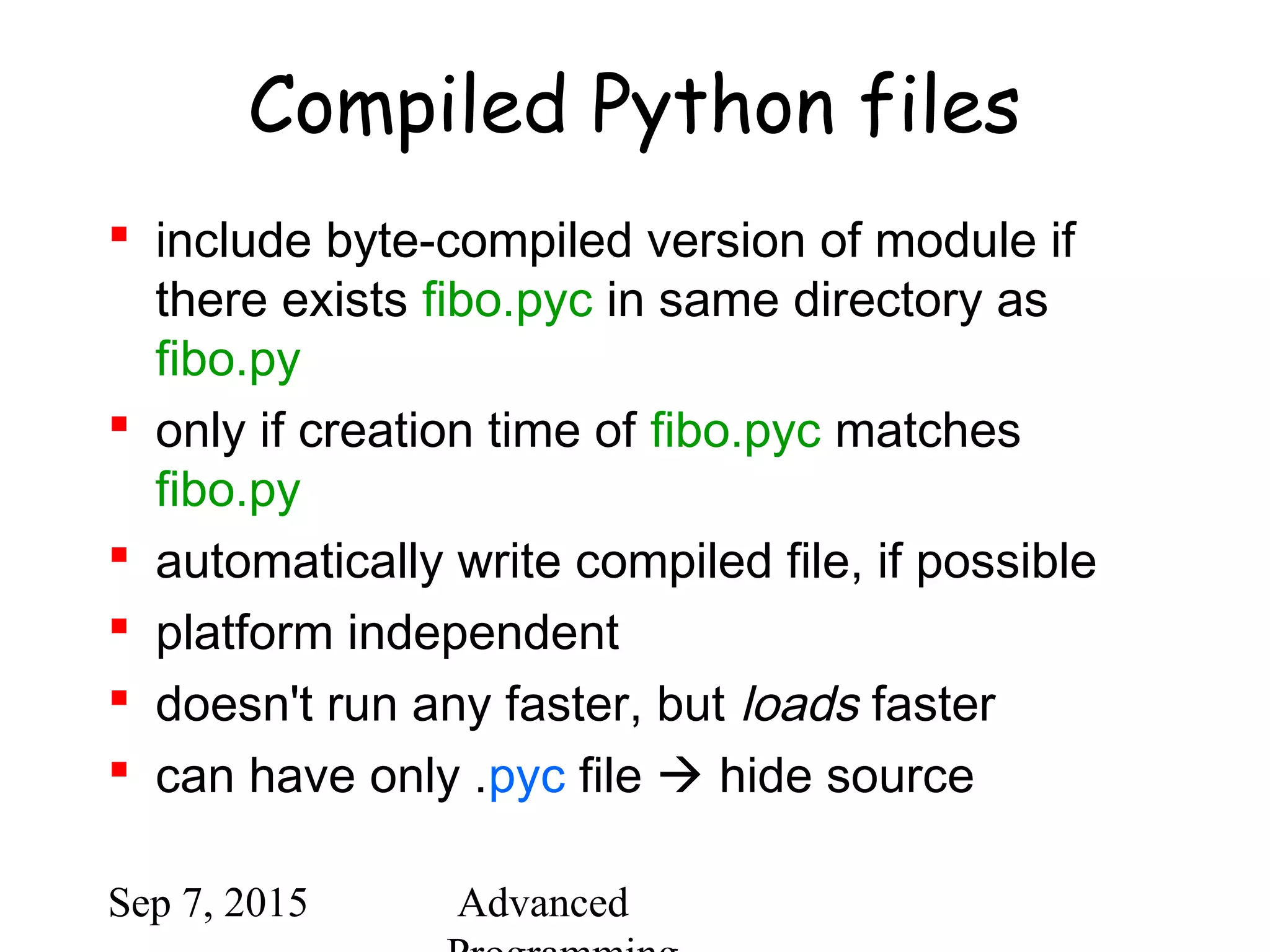
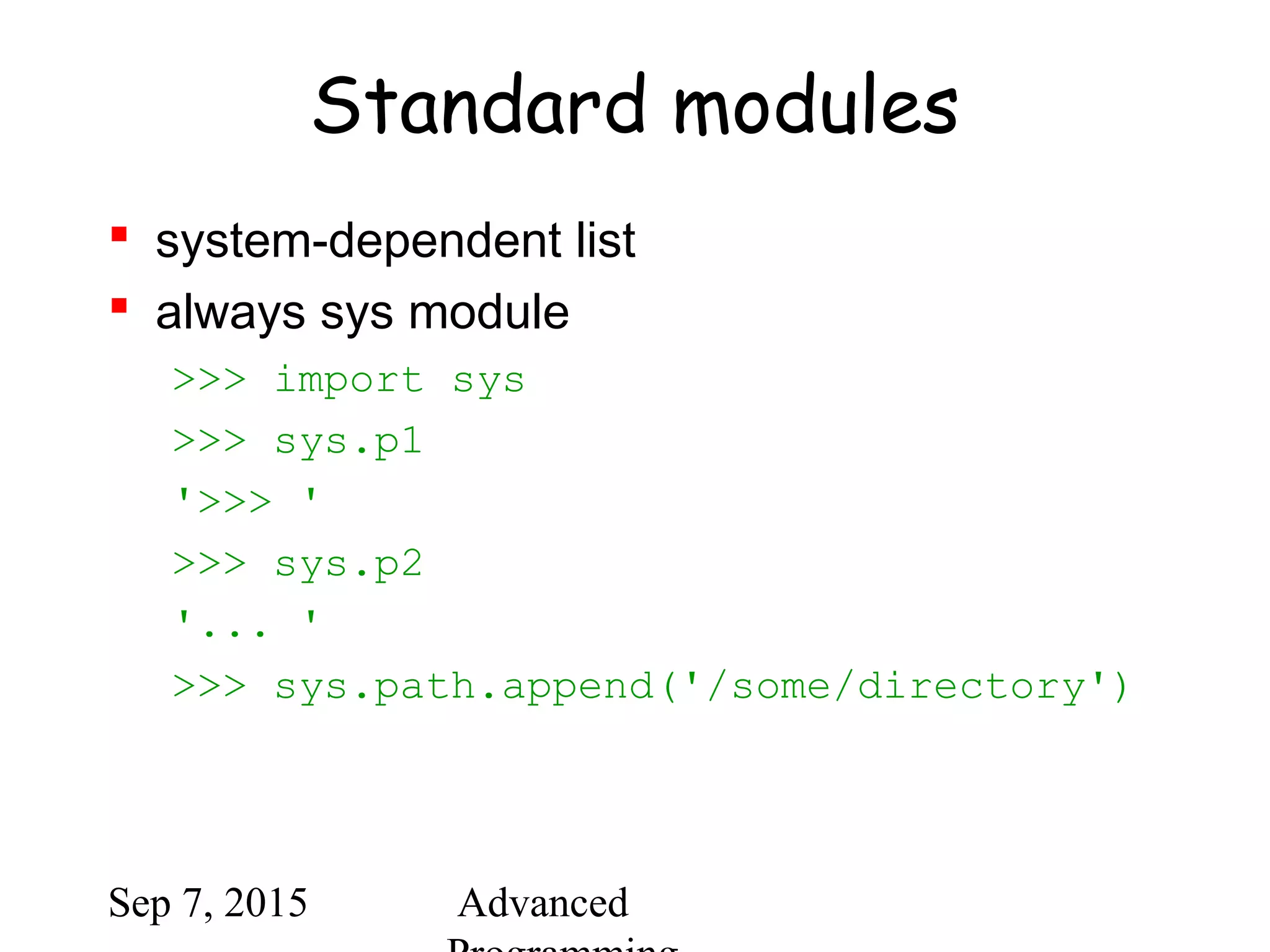
![Sep 7, 2015 Advanced
Module listing
use dir() for each module
>>> dir(fibo)
['___name___', 'fib', 'fib2']
>>> dir(sys)
['__displayhook__', '__doc__', '__excepthook__', '__name__', '__stderr__', '__st
din__', '__stdout__', '_getframe', 'argv', 'builtin_module_names', 'byteorder',
'copyright', 'displayhook', 'dllhandle', 'exc_info', 'exc_type', 'excepthook', '
exec_prefix', 'executable', 'exit', 'getdefaultencoding', 'getrecursionlimit', '
getrefcount', 'hexversion', 'last_type', 'last_value', 'maxint', 'maxunicode', '
modules', 'path', 'platform', 'prefix', 'ps1', 'ps2', 'setcheckinterval', 'setpr
ofile', 'setrecursionlimit', 'settrace', 'stderr', 'stdin', 'stdout', 'version',
'version_info', 'warnoptions', 'winver']](https://image.slidesharecdn.com/python-bb10da9e-c171-47c6-9bfc-577b4e9d0dd4-1201208930-150907064501-lva1-app6891/75/python-ppt-47-2048.jpg)
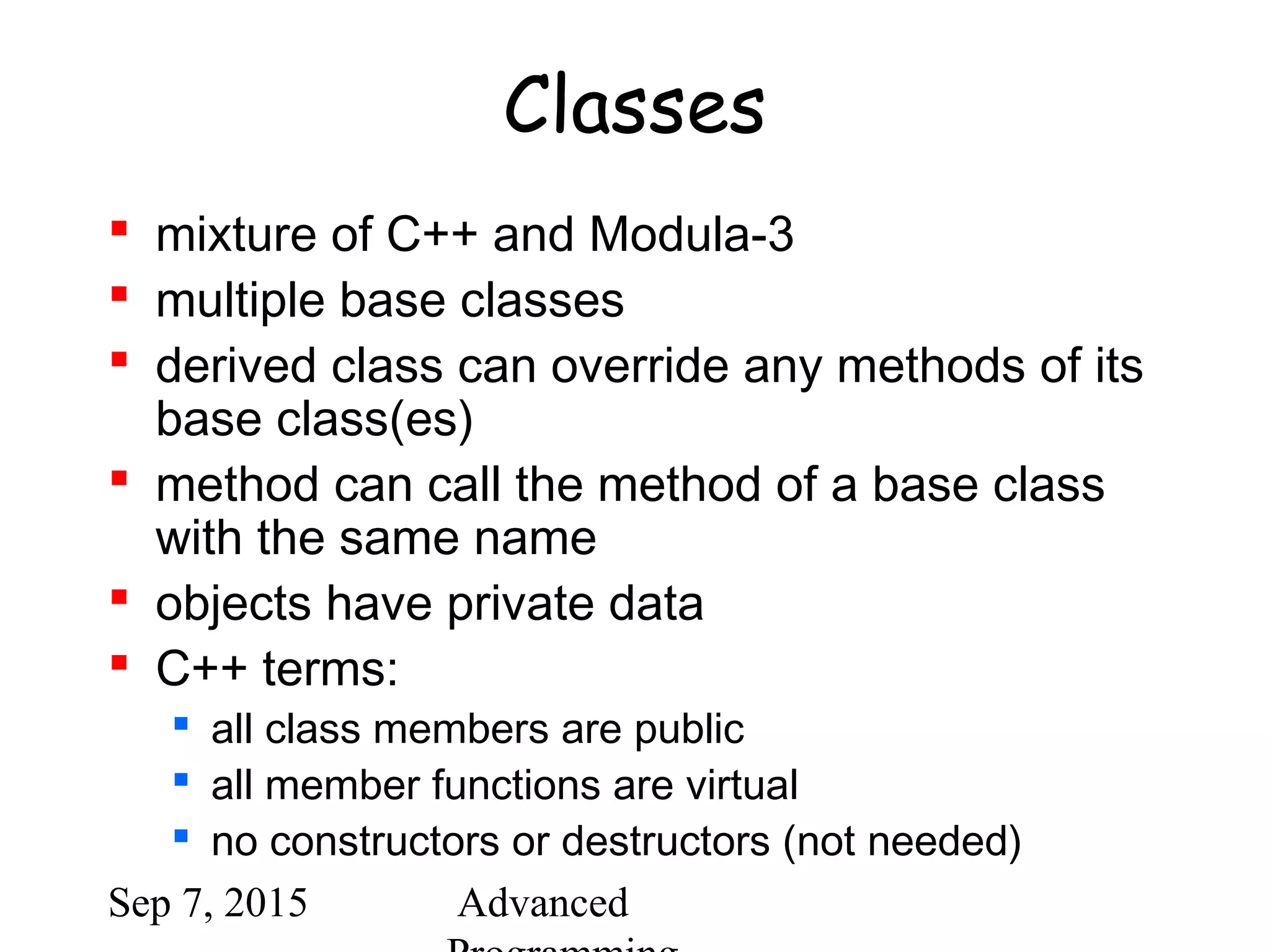
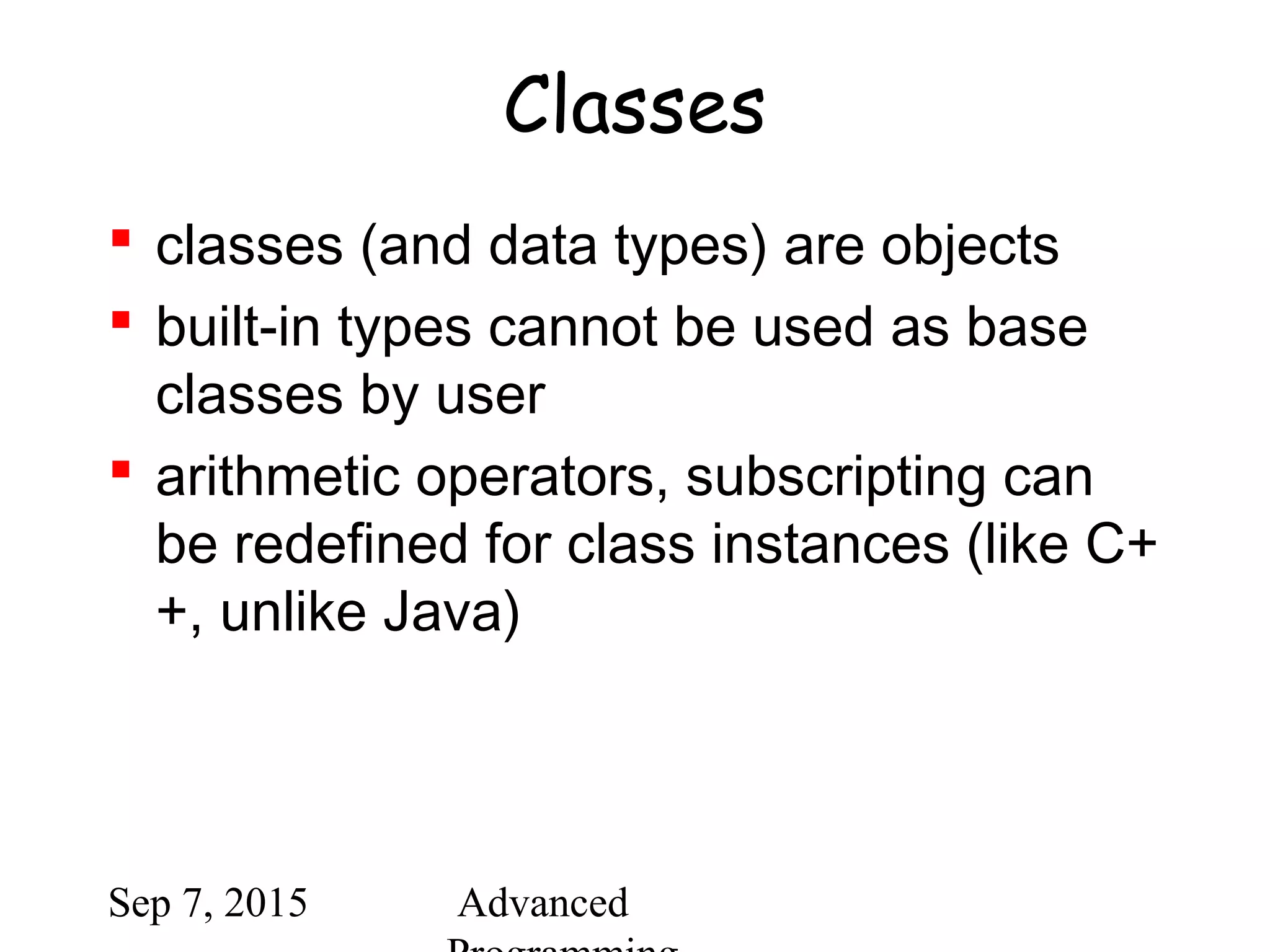
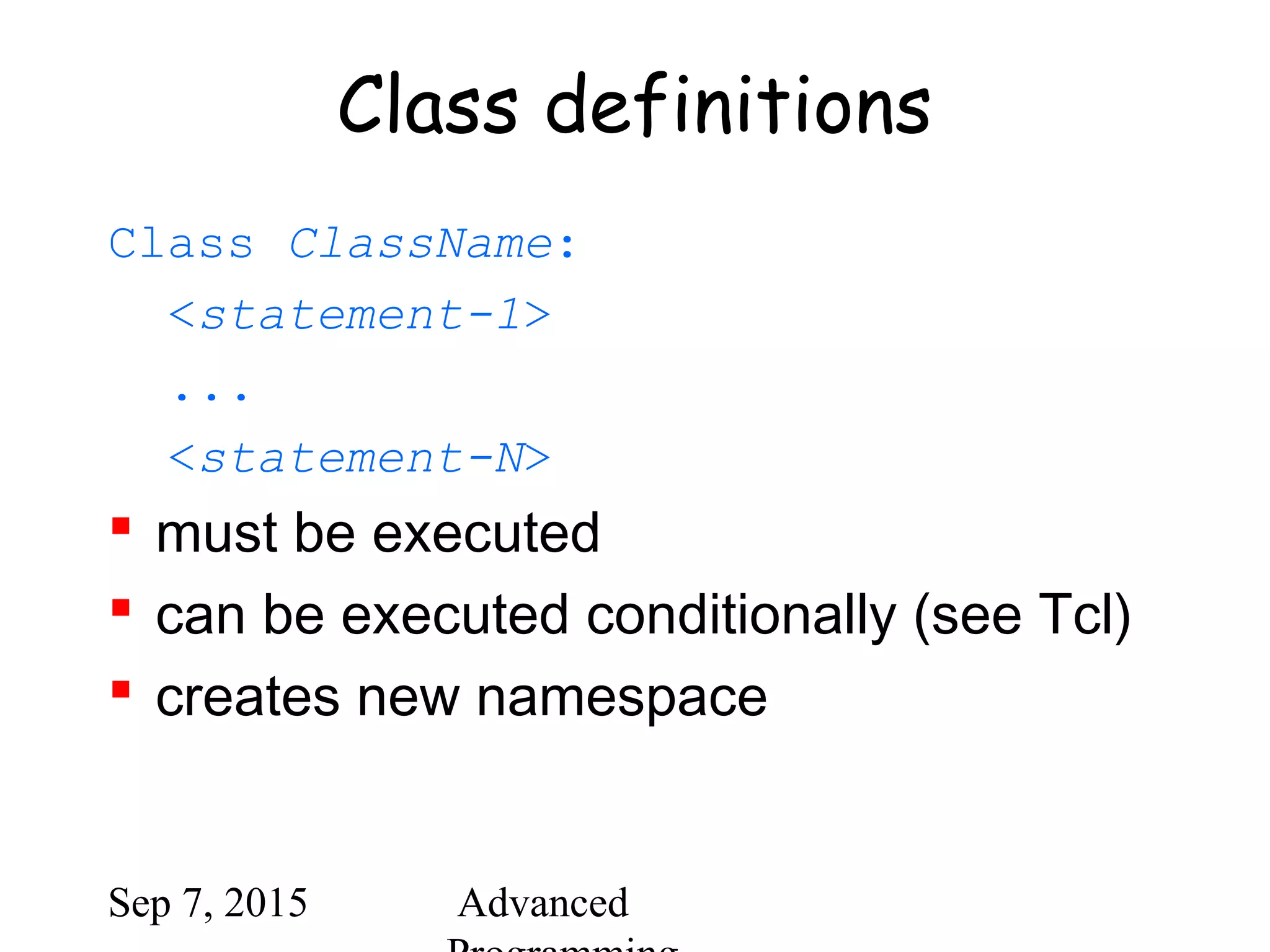
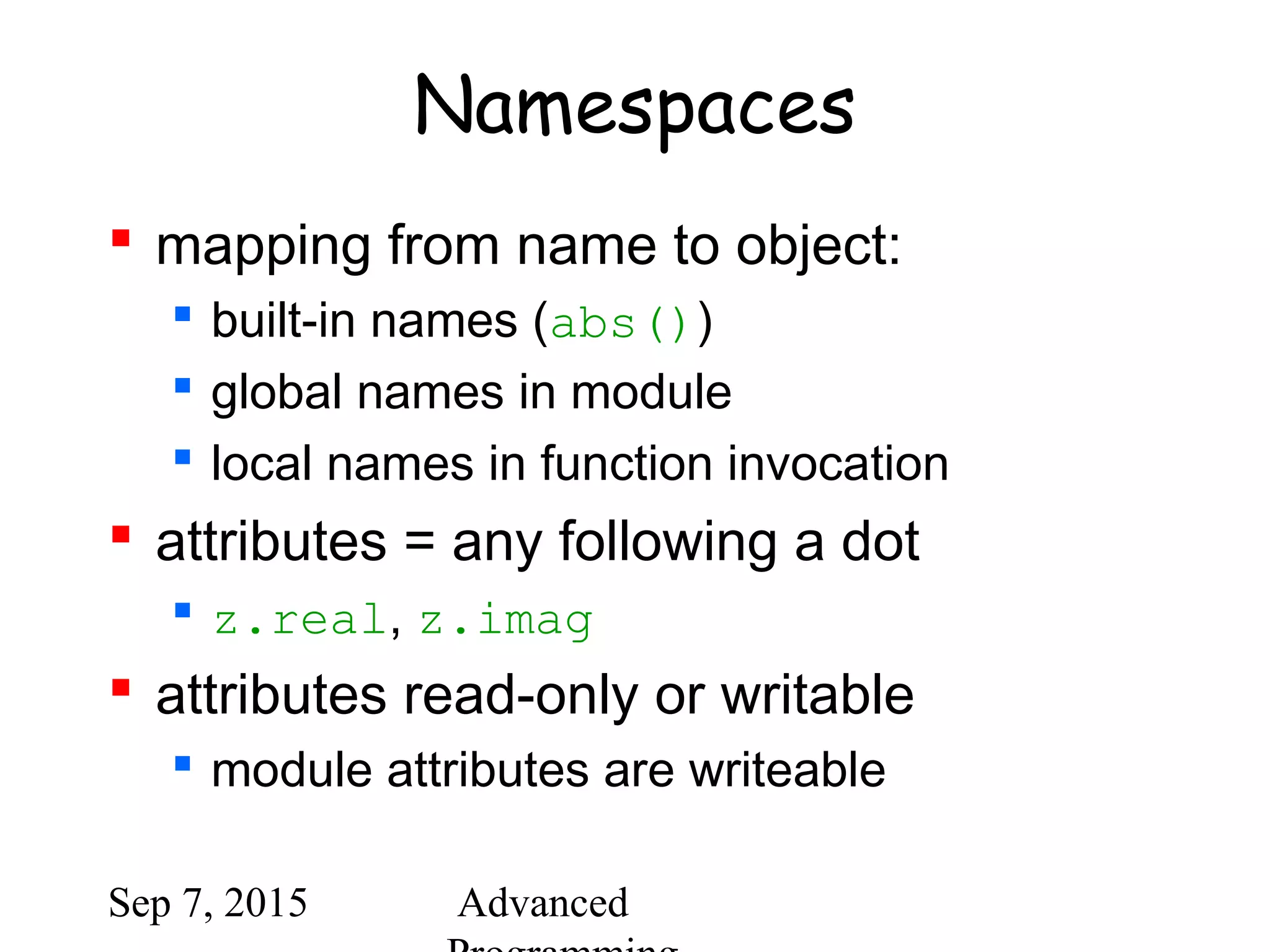
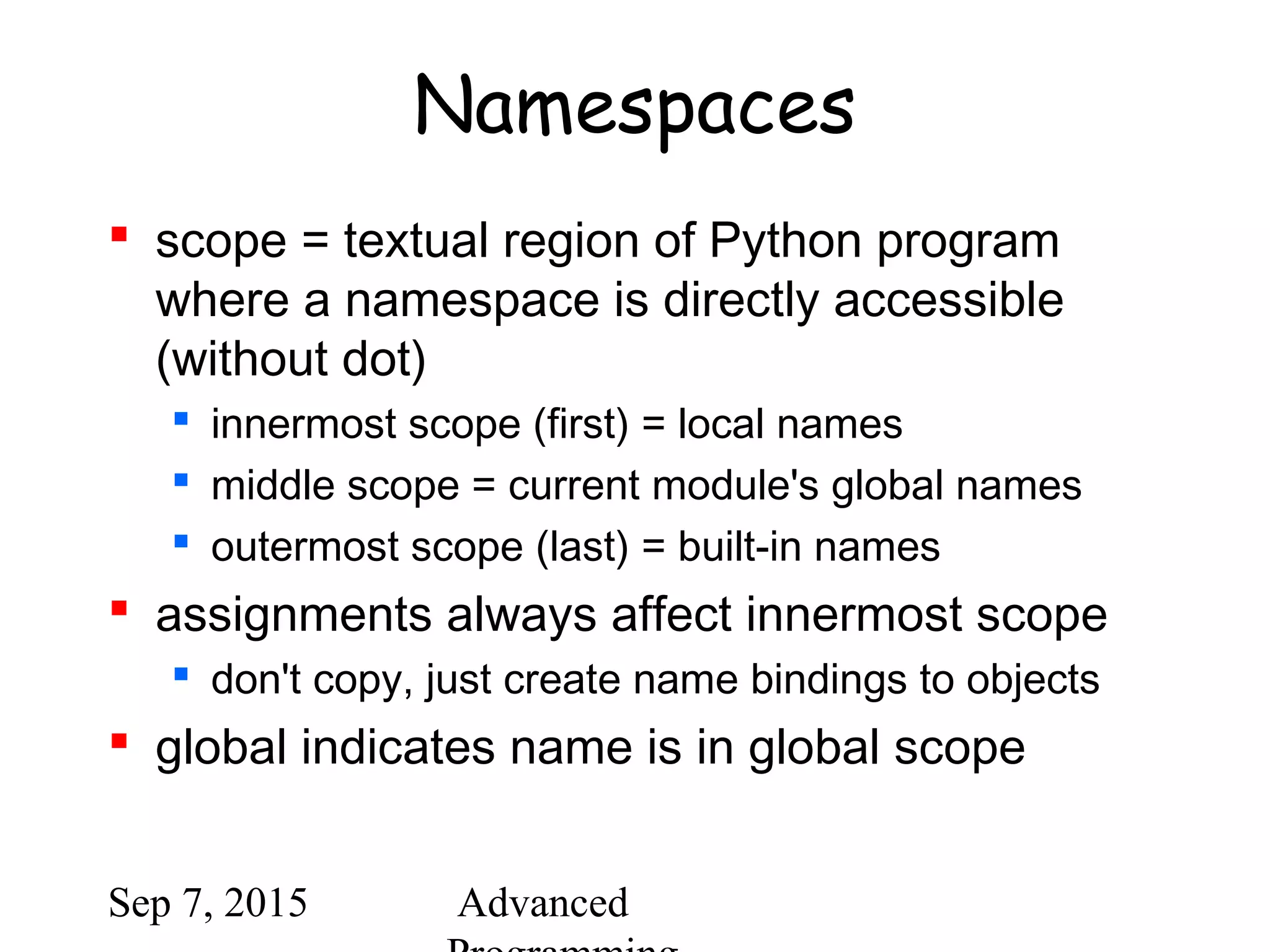
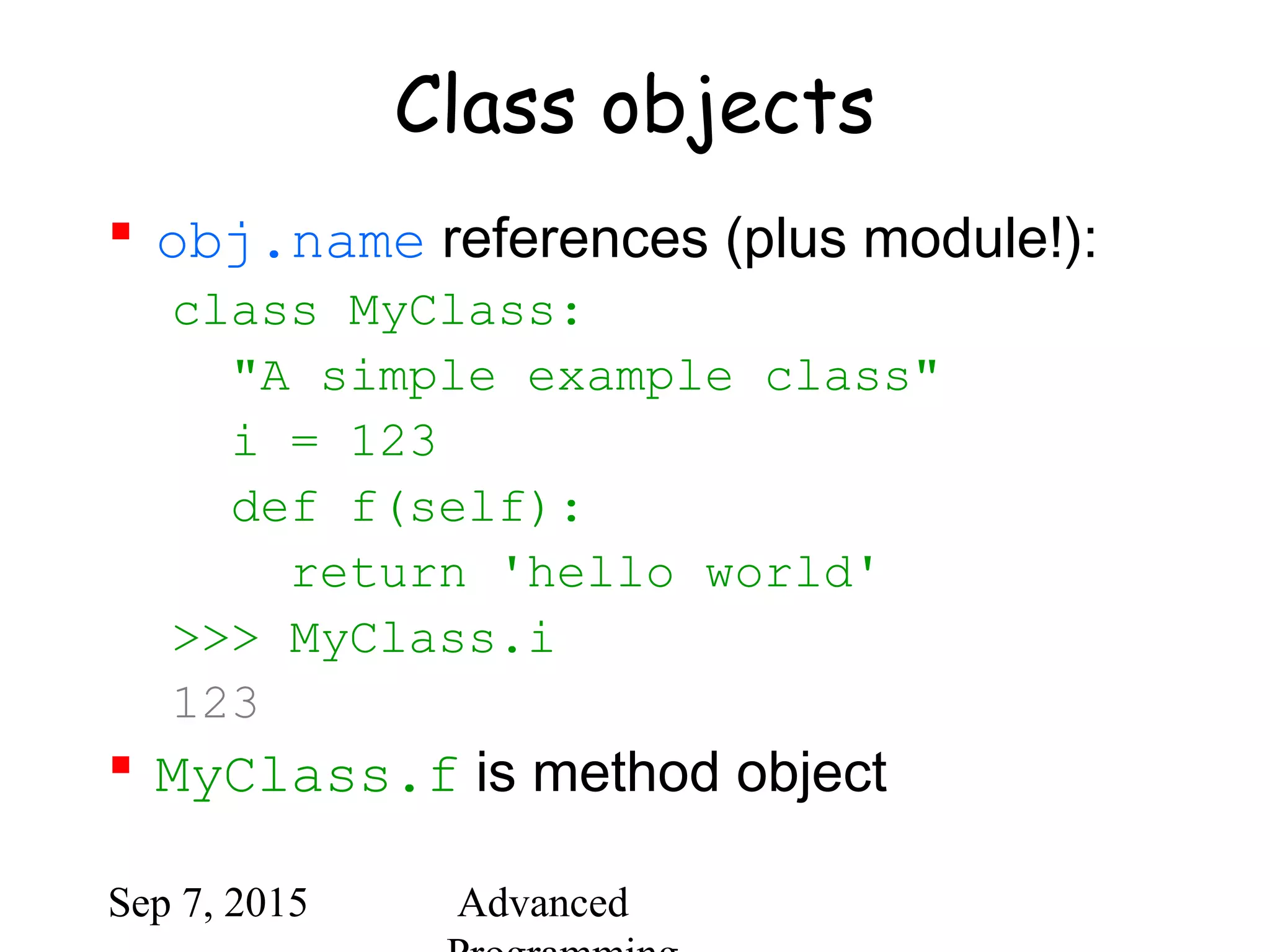
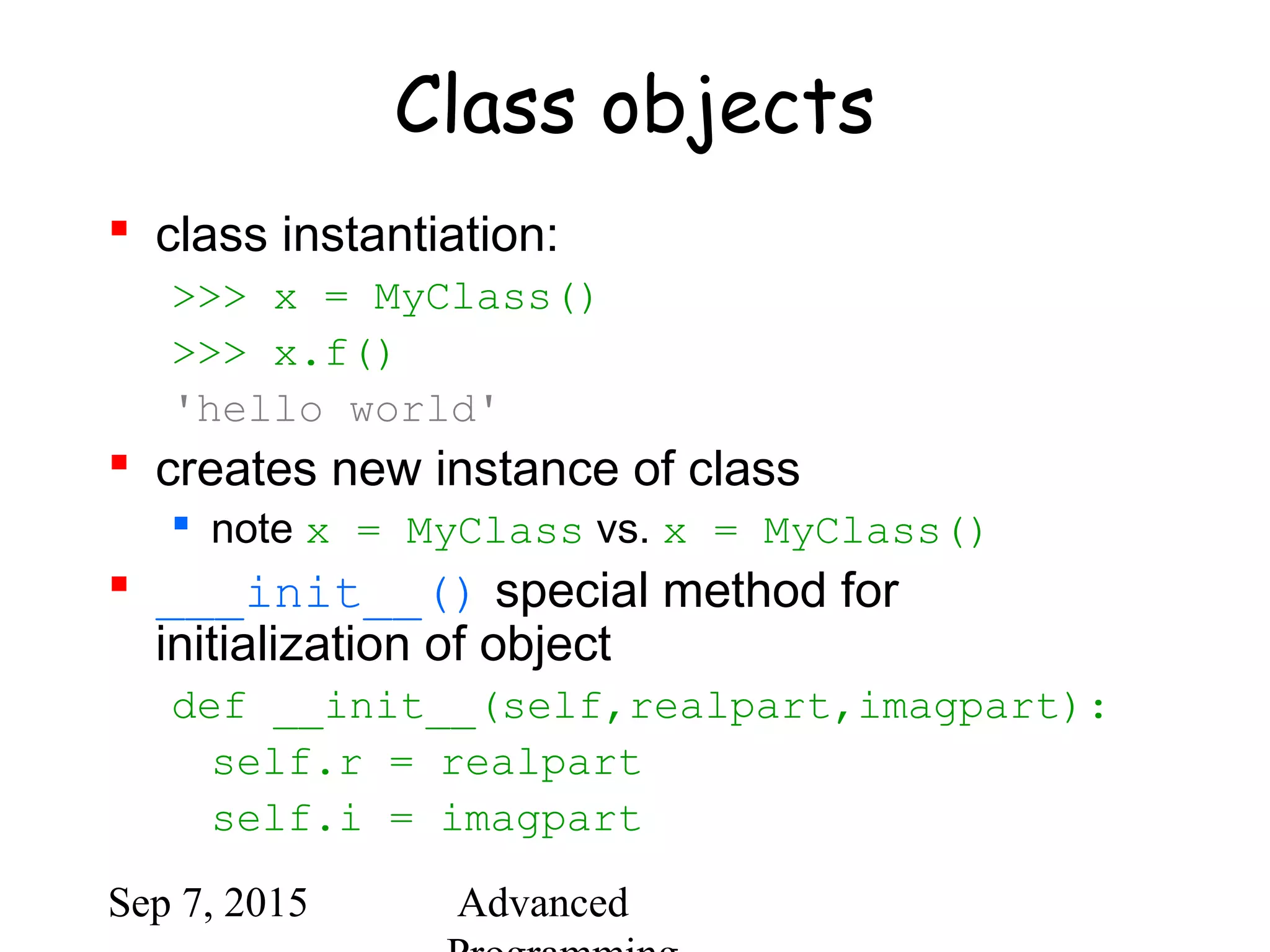
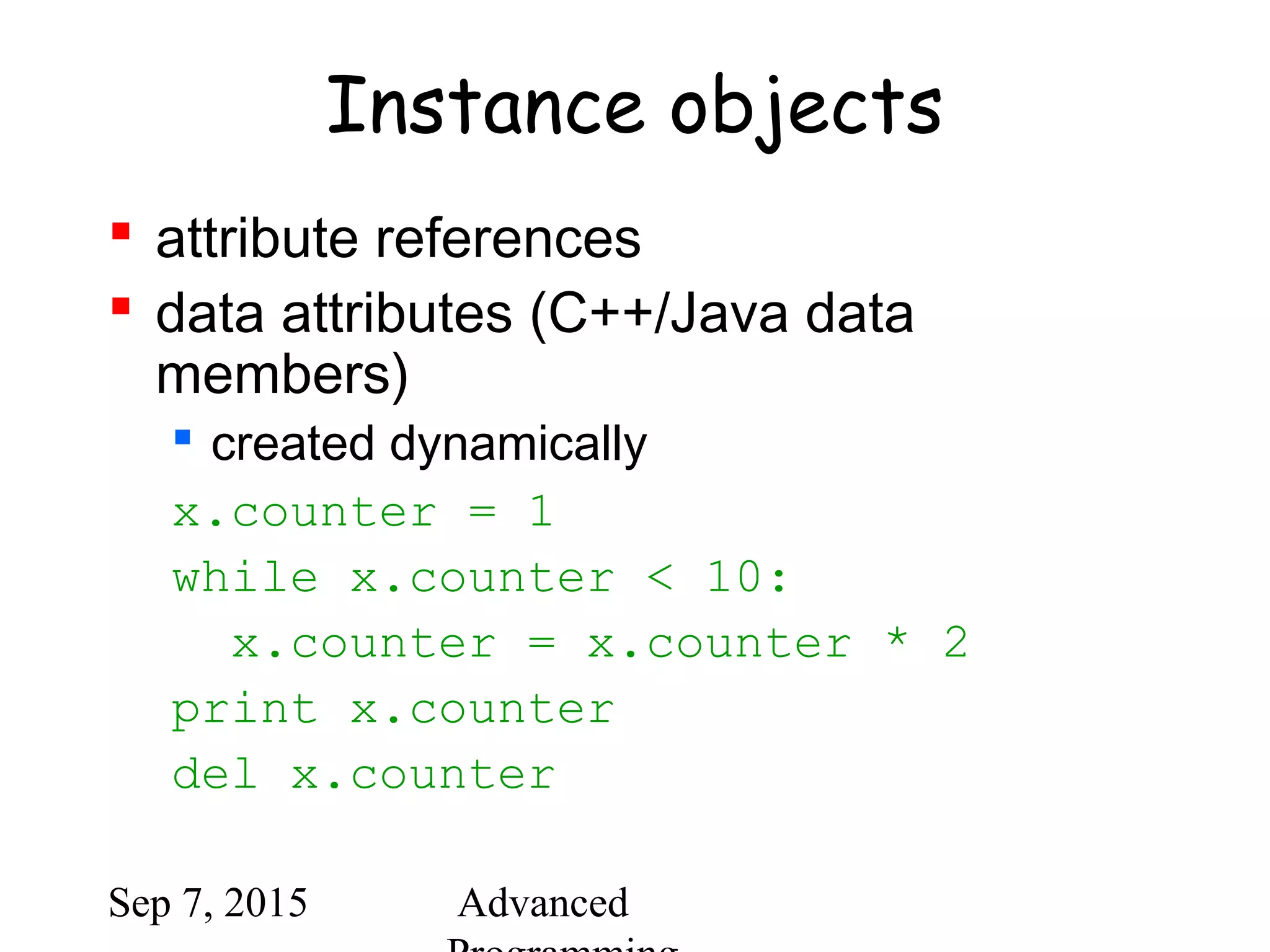
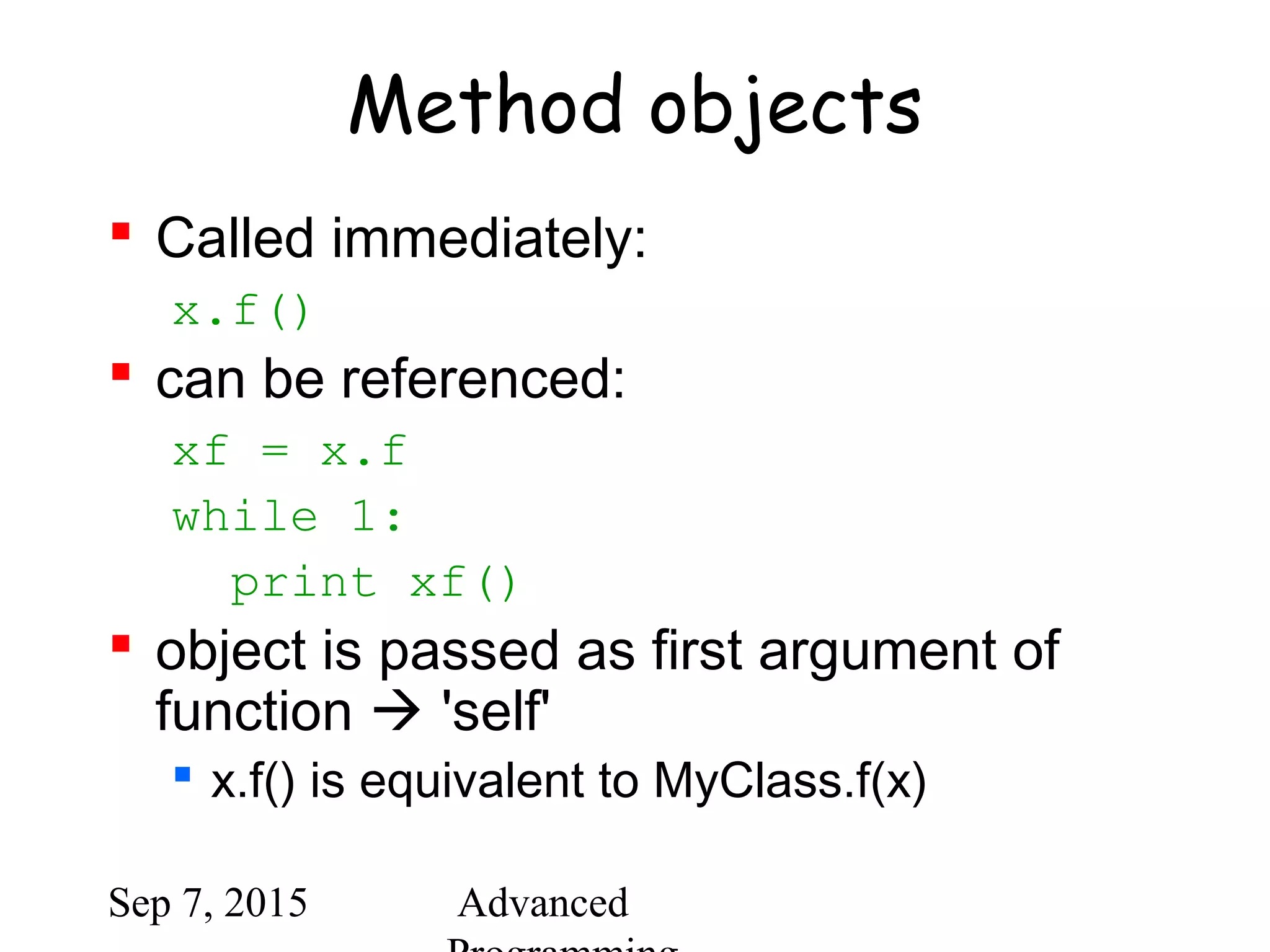
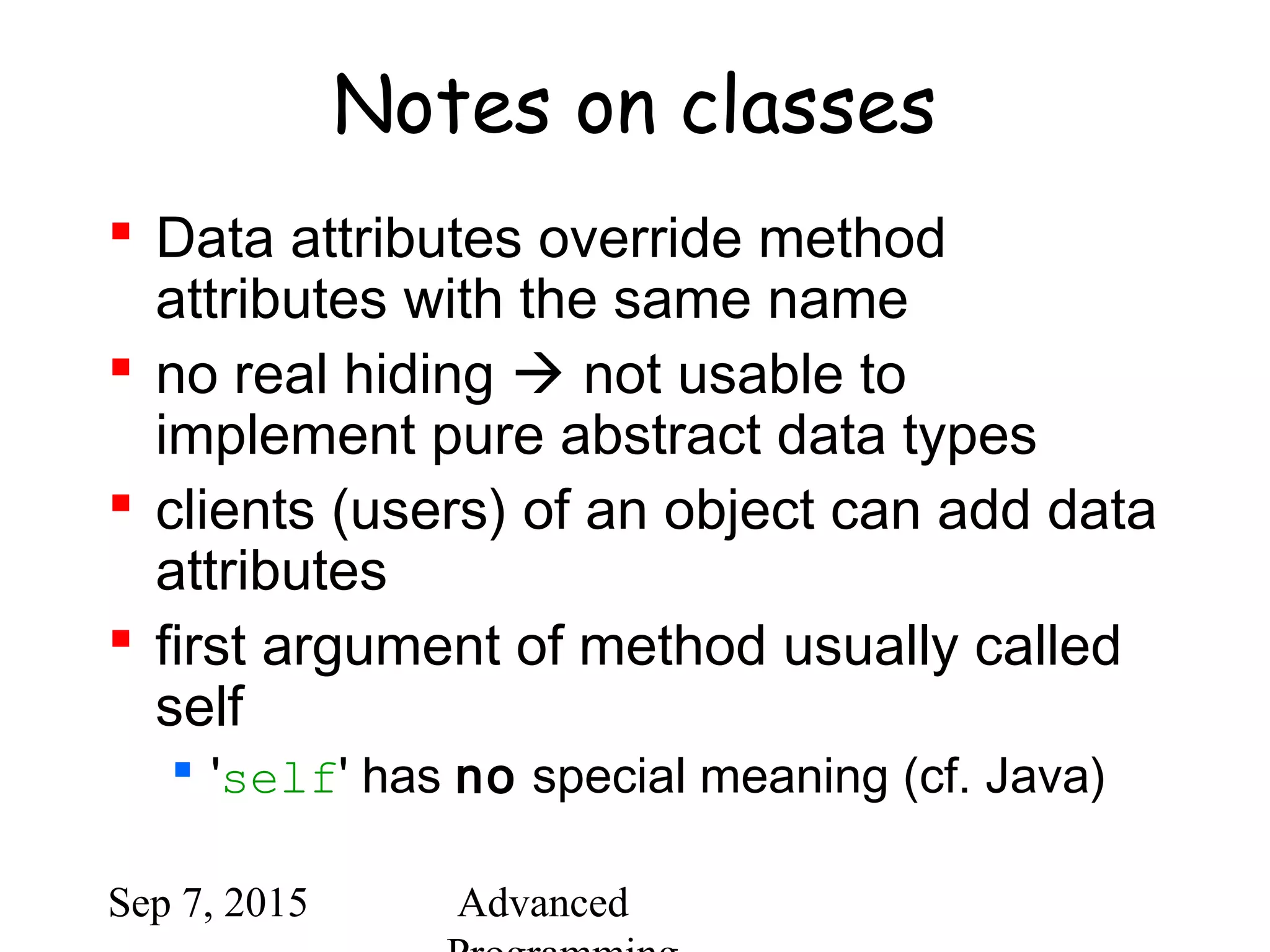
![Sep 7, 2015 Advanced
Another example
bag.py
class Bag:
def __init__(self):
self.data = []
def add(self, x):
self.data.append(x)
def addtwice(self,x):
self.add(x)
self.add(x)](https://image.slidesharecdn.com/python-bb10da9e-c171-47c6-9bfc-577b4e9d0dd4-1201208930-150907064501-lva1-app6891/75/python-ppt-58-2048.jpg)
![Sep 7, 2015 Advanced
Another example, cont'd.
invoke:
>>> from bag import *
>>> l = Bag()
>>> l.add('first')
>>> l.add('second')
>>> l.data
['first', 'second']](https://image.slidesharecdn.com/python-bb10da9e-c171-47c6-9bfc-577b4e9d0dd4-1201208930-150907064501-lva1-app6891/75/python-ppt-59-2048.jpg)
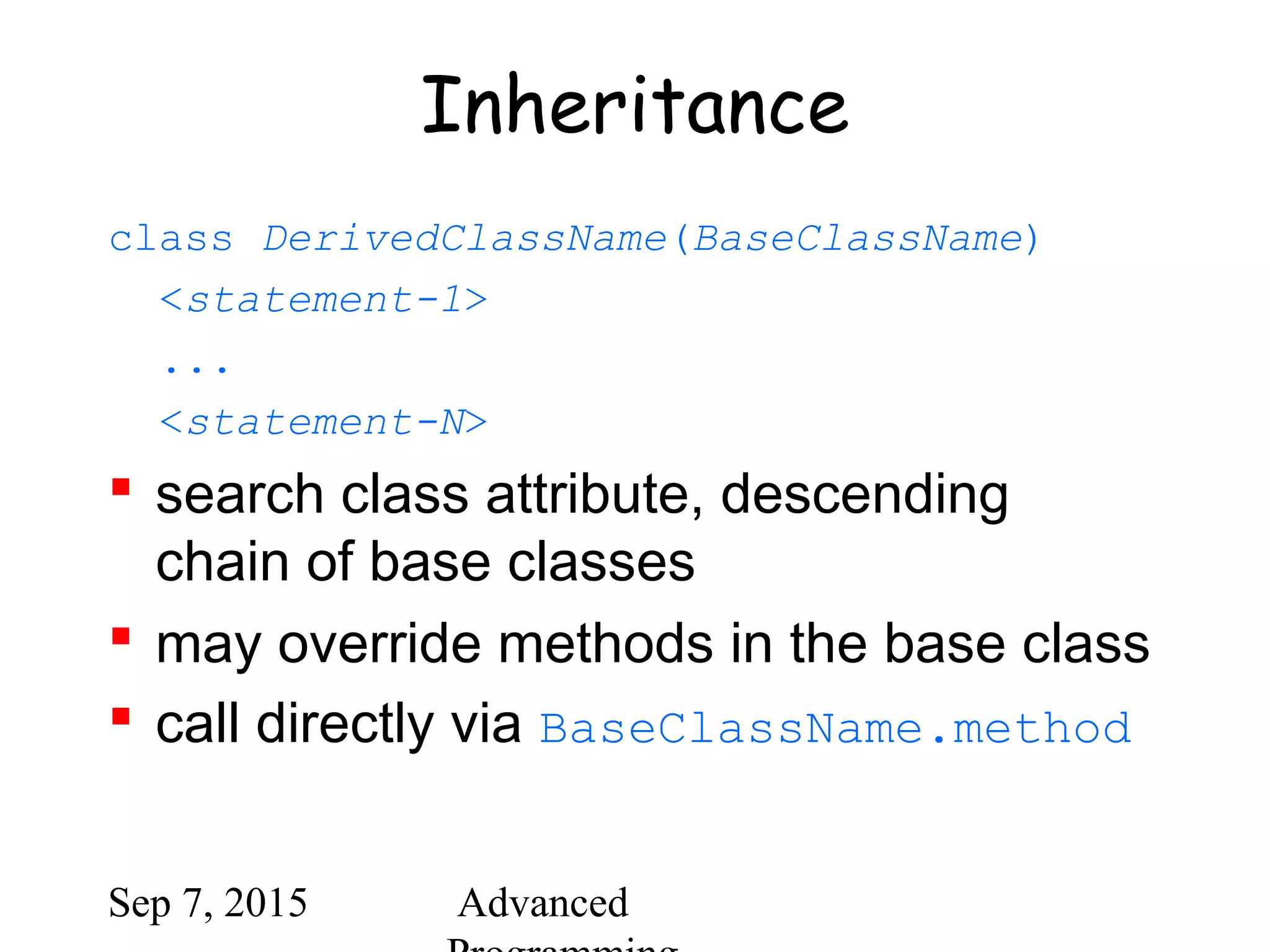
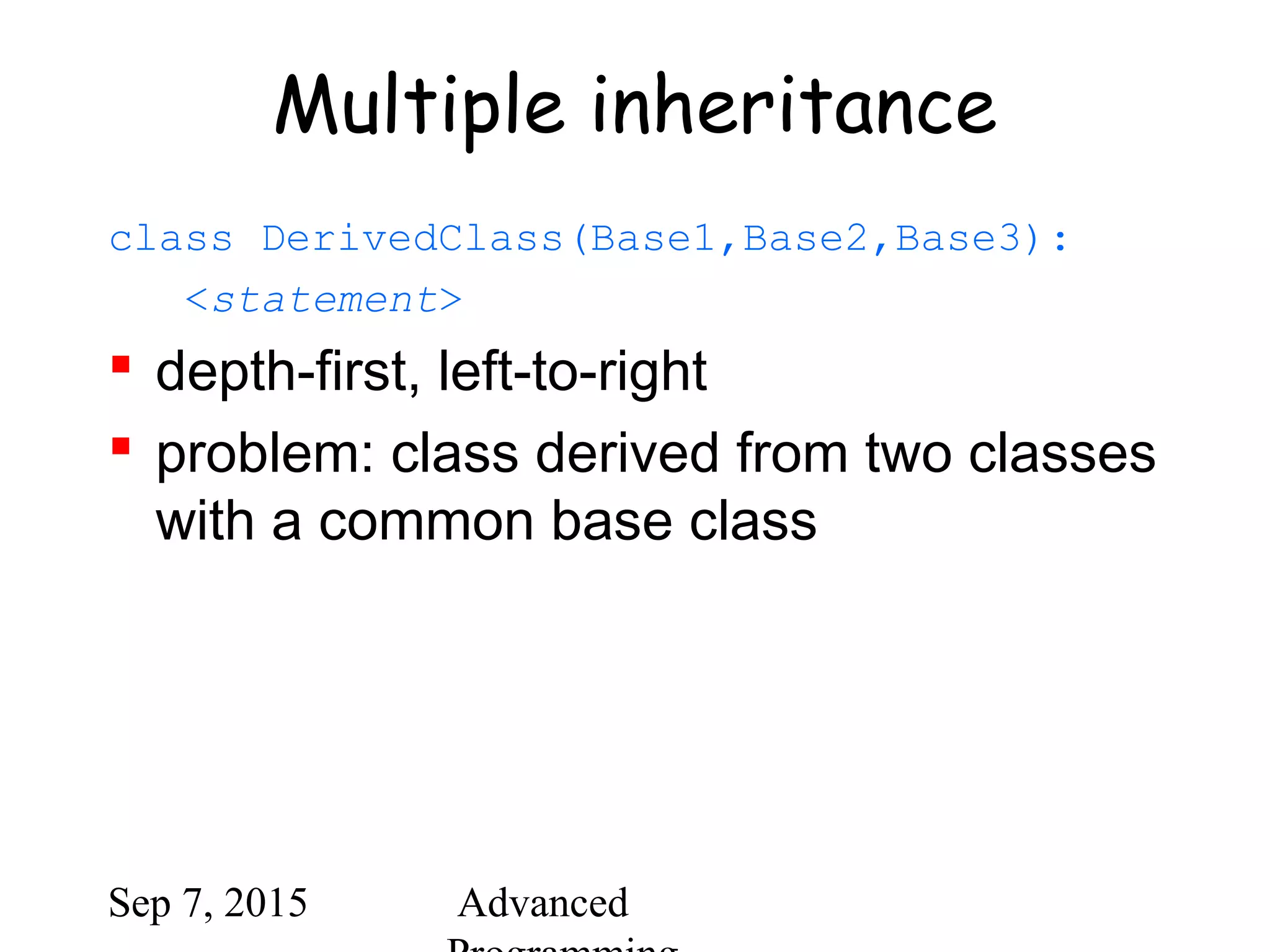
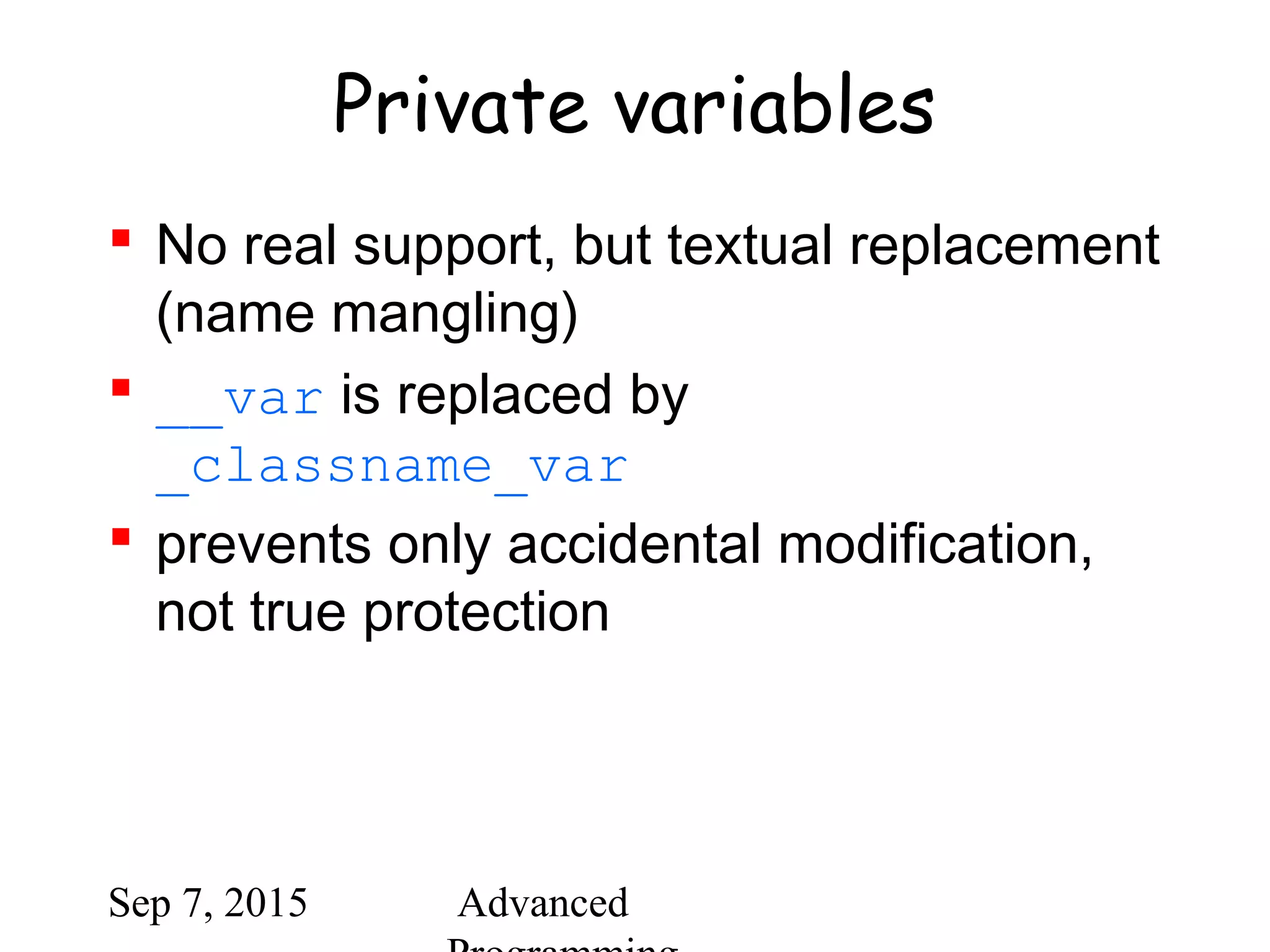
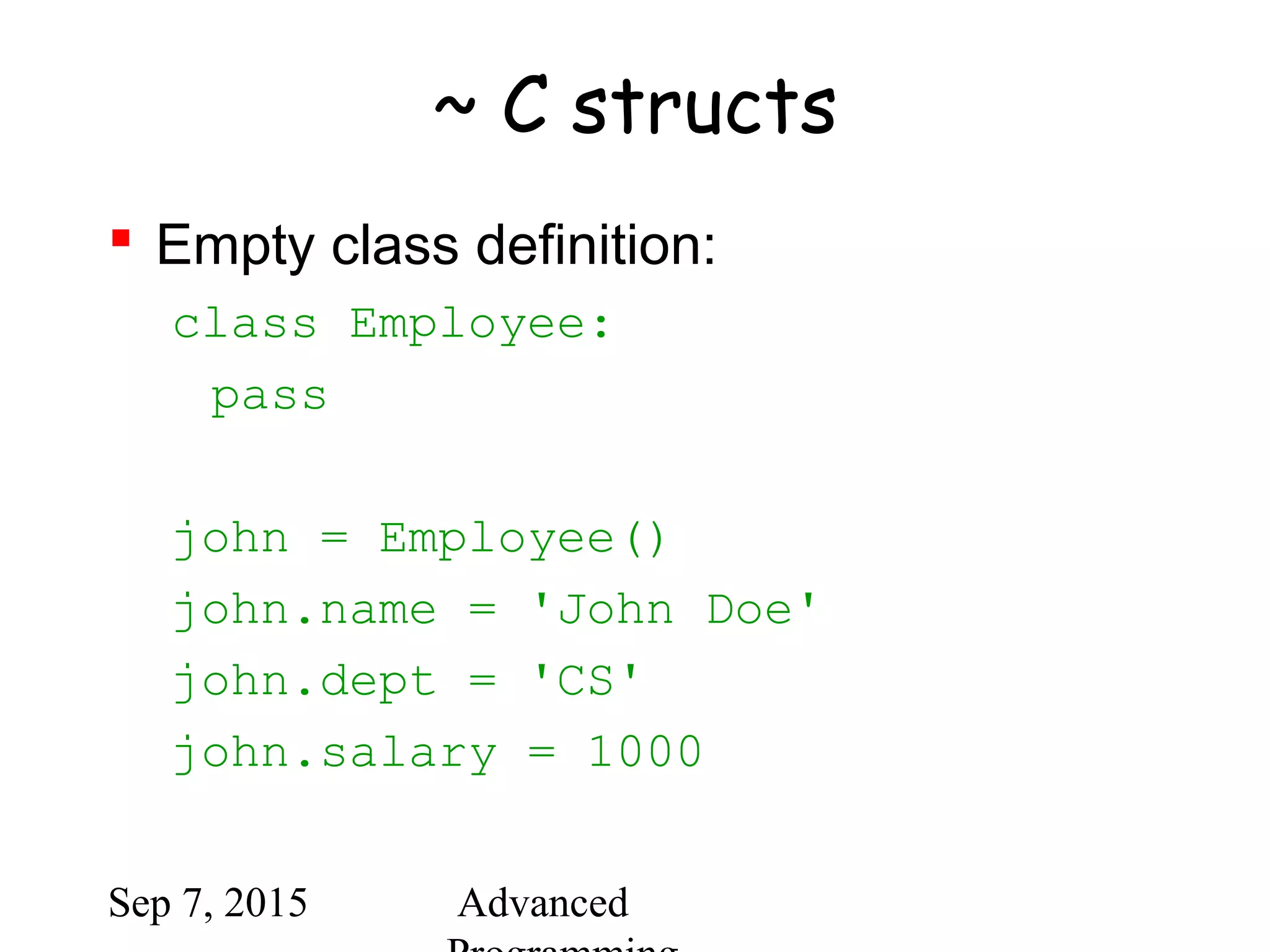
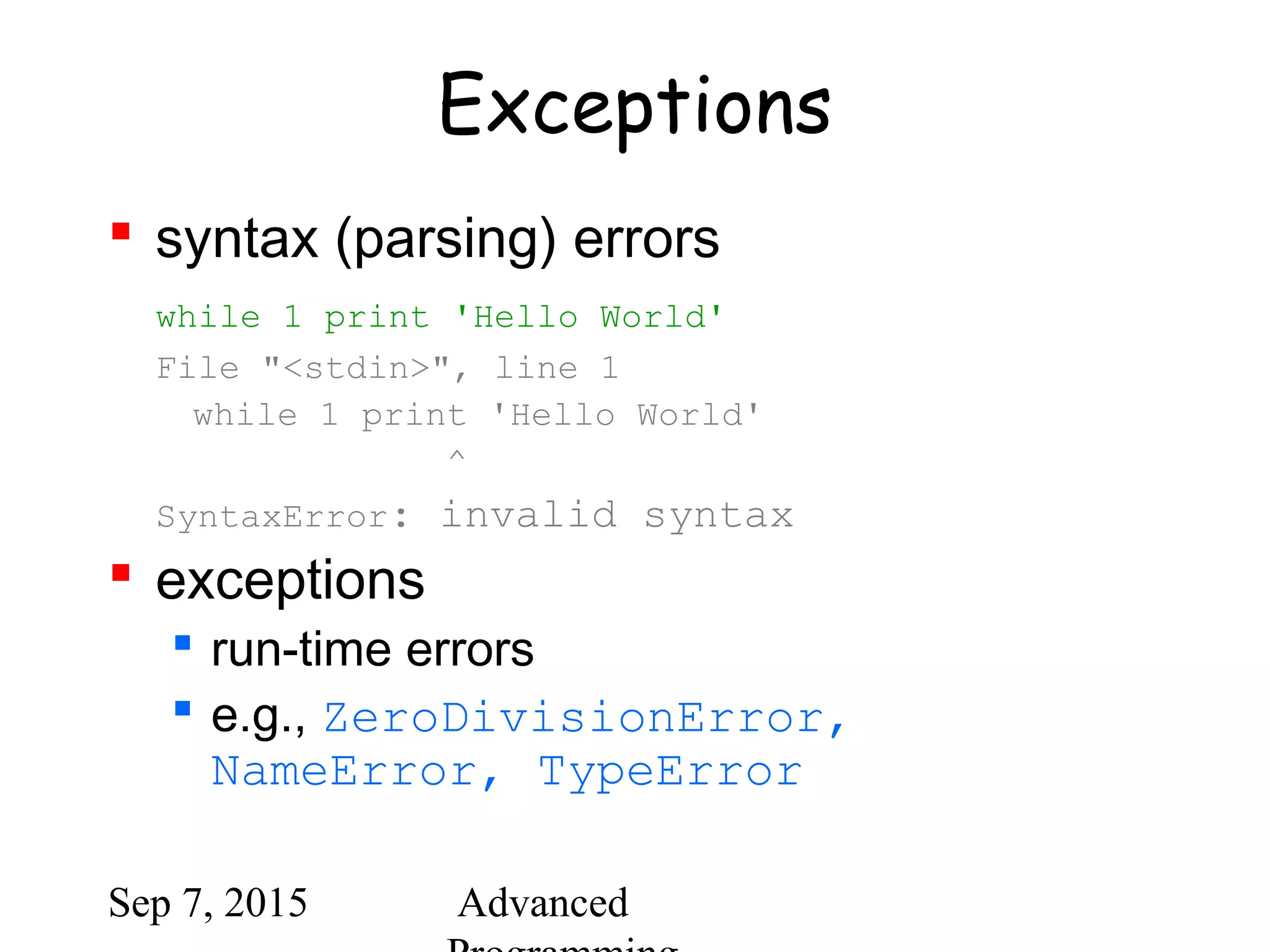
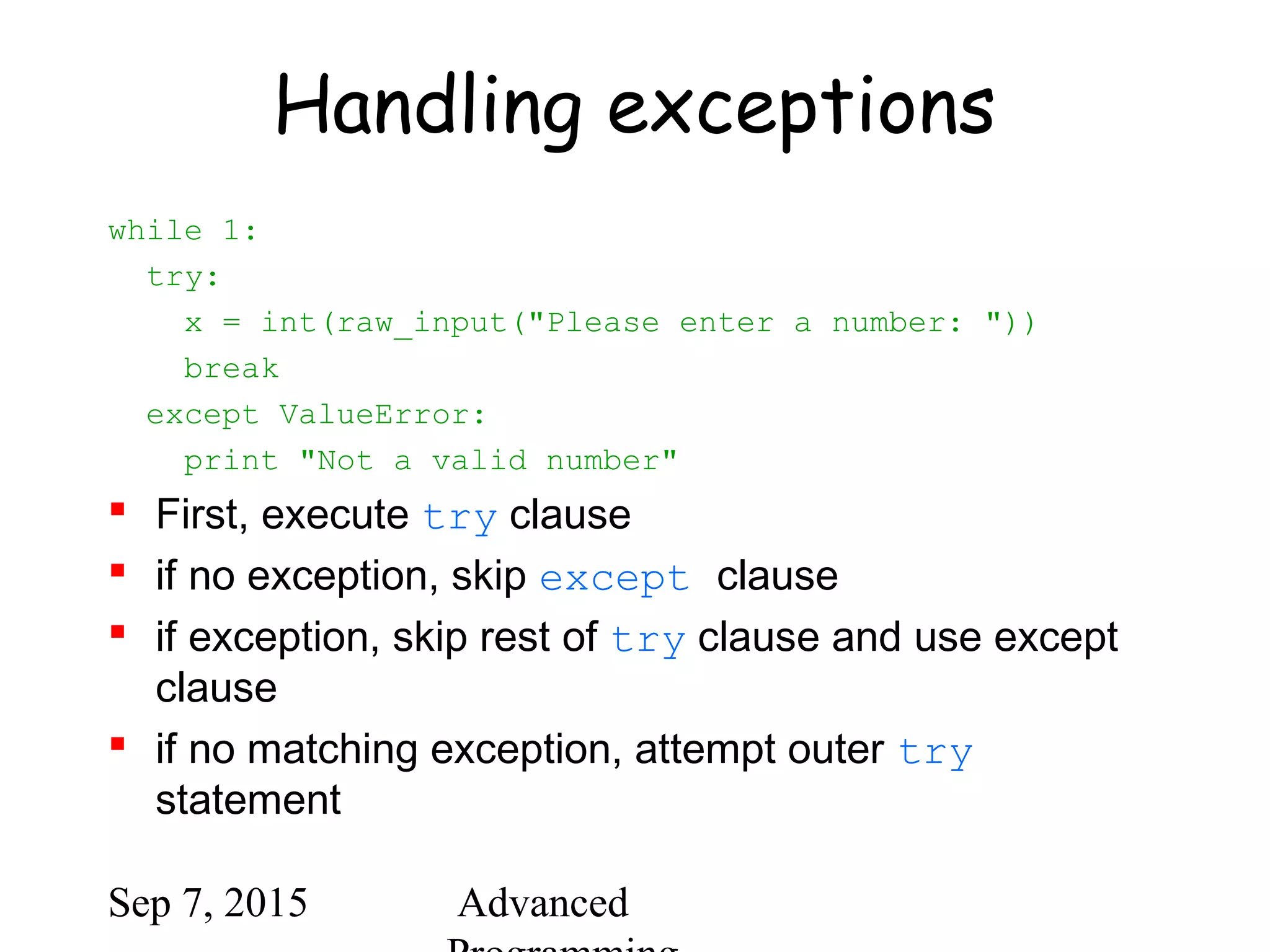
![Sep 7, 2015 Advanced
Handling exceptions
try.py
import sys
for arg in sys.argv[1:]:
try:
f = open(arg, 'r')
except IOError:
print 'cannot open', arg
else:
print arg, 'lines:', len(f.readlines())
f.close
e.g., as python try.py *.py](https://image.slidesharecdn.com/python-bb10da9e-c171-47c6-9bfc-577b4e9d0dd4-1201208930-150907064501-lva1-app6891/75/python-ppt-66-2048.jpg)
